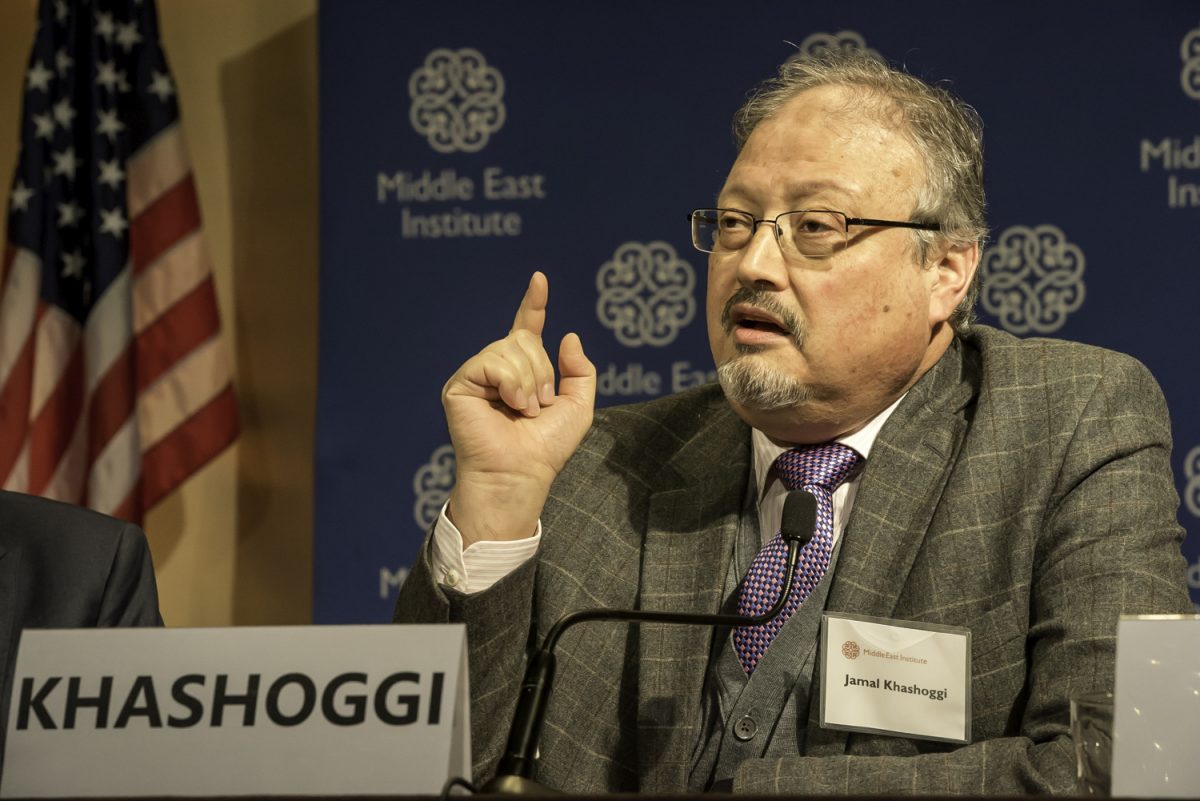From the Academy Award-winning director of Icarus, Bryan Fogel, comes the untold story of the murder that shook the world.
Washington Post journalist Jamal Khashoggi was critical of his beloved Saudi Arabia and of Crown Prince Mohammed bin Salman’s policies. On October 2, 2018, Khashoggi entered the Saudi Arabian consulate in Istanbul and never came out. His fiancée and dissidents around the world are left to piece together clues to his brutal murder—and in their dogged quest for truth, they expose a global cover-up perpetrated by the very country he loved.
With exclusive access to the Turkish government’s evidence; to Khashoggi’s fiancée, Hatice Cengiz; and to Khashoggi’s close friend and fellow Saudi insurgent, Omar Abdulaziz, Academy Award–winning filmmaker Bryan Fogel unearths hidden secrets in this real-life international thriller that will continue to rock the world long after the headlines have faded away.
Chillingly powerful and heartbreakingly candid, The Dissident is an intimate portrait of a man who sacrificed everything for freedom of speech. With this cogent film, Fogel joins a cadre of dreamers across the globe who refuse to squelch the life’s work of an intrepid rebel, who, even after death, is defying those who sought to silence him forever.
ARISE AND PREPARE, DETERMINED TO LEAVE.
THE TROUBLE HAS REACHED ITS BREAKING POINT
AND DO NOT TURN BACK TO THE FAMILY AND THE COUNTRY,
BECAUSE THE FREE DEPARTS FROM HARM FOR HIS OWN DIGNITY.
—ALI IBN AL-MUQARRAB AL-UYUNI, 13TH CENTURY
[♪♪]
MONTREAL, CANADA
[MAN SPEAKING IN ARABIC] And I know, I know. I’m not giving you all the details. I’m not giving you details because I know it’s a lot for you to process. But I am really under a lot of threats right now.
JANUARY 20, 2019
THREE MONTHS AFTER JAMAL KHASHOGGI’S MURDER
[MAN SPEAKING IN ARABIC] But look, I will send you a video. Delete it right away. The video is about something… Something illegal that we are doing. We’re developing the machine right now. No, no, let me tell you something. Look, God will forgive us. The religious aspect, the humanity aspect, i swear to God we are considering everything. But this case right now… It’s all about revenge.
OMAR [IN ENGLISH]: I didn’t want to believe in the beginning, what happened to Jamal.
MALE NEWS ANCHOR [IN ENGLISH]: Prominent Saudi journalist and Washington Post columnist has gone missing after visiting his country’s consulate in Istanbul.
[♪♪]
OMAR [IN ENGLISH]: Yes, I knew that I was doing something dangerous. But I didn’t know that, you know, we’re going to lose so many lives because of it.
FEMALE NEWS ANCHOR [IN ENGLISH]: On Tuesday, Jamal Khashoggi entered the Saudi consulate in Istanbul but hasn’t been seen since.
[CAMERA SHUTTERS CLICKING]
MALE NEWS ANCHOR: Saudi and Turkish officials have given conflicting accounts on the whereabouts of Jamal Khashoggi, who’s known for criticizing Crown Prince Mohammed bin Salman’s policy inside Saudi Arabia.
FEMALE NEWS ANCHOR: Once an adviser and friend of Saudi’s royal and elites, he now lives in self-exile in the U.S. and is an outspoken critic of his government’s policies.
OMAR [IN ARABIC]: I’m never going to stop for a single day. Not a single day! No matter what happens, in this case, if it doesn’t work the clean way, I will use dirty ways.
[♪♪]
FEMALE NEWS ANCHOR [IN ENGLISH]: Turkish authorities believe prominent Saudi journalist, Jamal Khashoggi, has been killed.
[CAMERA SHUTTER CLICKS]
OMAR [IN ENGLISH]: In Saudi Arabia, having an opinion is a crime, but Jamal’s death changed everything.
[♪♪]
OMAR [IN ENGLISH]: My Name is Omar Abdulaziz Alzahrani. I’m 27 years old. I’m from Saudi Arabia. I was born there. But, I cannot go back home. Ever. I cannot contact my family. I cannot contact my parents, my friends, brothers. In the last couple of months, you know, every day, every night, just I’m… I’m waiting for bad news.
I just received this, you know, while we were walking. Just three minutes ago. It’s anonymous and he’s saying that, “Just be careful. Move from city to another one. Do not use your phone, try to change your phone number, and there’s a team that’s going to kill you soon.” It’s from Canada. It’s not from outside the country.
Last year, I was working with Jamal in different projects. I felt that Jamal wanted to do something, wanted to help. So, I believed in him. But he warned me. He said, “This kind of work might get you killed.”
[♪♪]
JAMAL KHASHOGGI [IN ENGLISH] …what I want in my retirement. I’m 60 years old, and I want to enjoy life, and I want to be free. Unfortunately, the government treated me as if I shot the King, God forbid, and I ran away. As I am a traitor.
[♪♪]
OMAR [IN ENGLISH]: After his death, Jamal became a hero. We cry when we hear that the hero is killed. But his works, his cause, his vision, it would live forever.
What do you know about the bees?
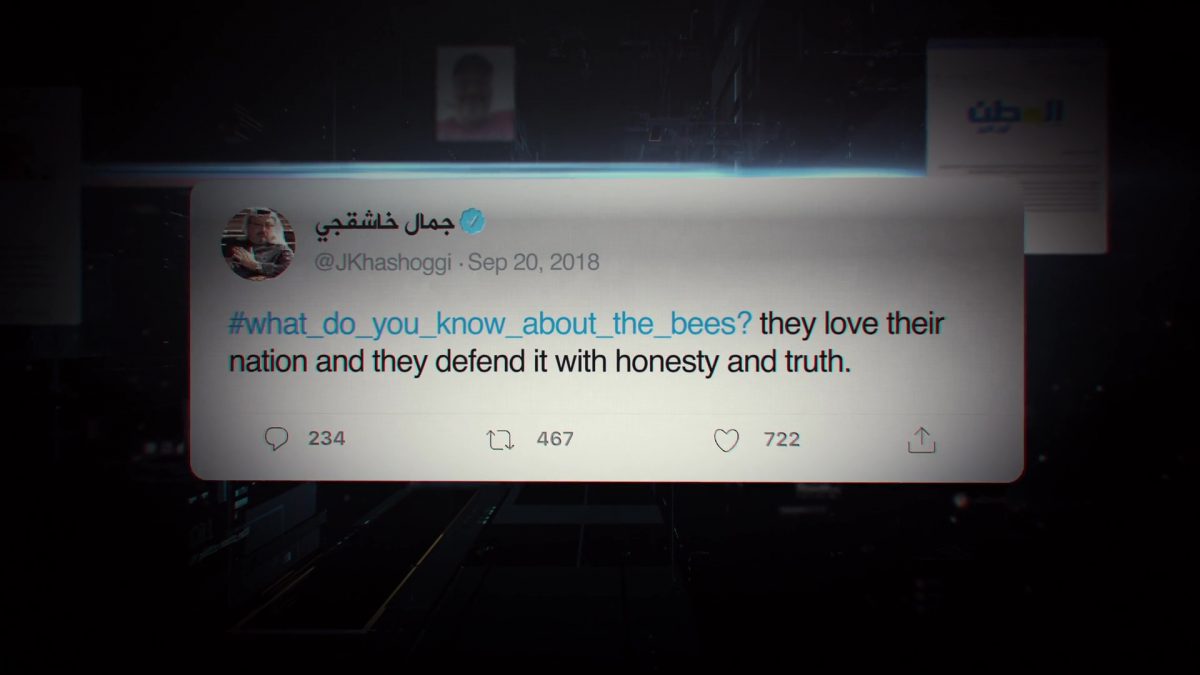
[♪♪]
ISTANBUL, TURKEY
OCTOBER 2, 2018
THE DAY OF JAMAL KHASHOGGI’S MURDER
IRFAN FIDAN [IN ARABIC]: Jamal Kashoggi’s and his fiancée, Hatice, went to the consulate to get marriage documents.
I’ve been a prosecutor for 20 years now. I can now say comfortably that through our investigations up to today, Jamal Kashoggi was not killed in an unplanned way.
CONSULATE OF SAUDI ARABIA
ISTANBUL, TURKEY
MALE INTERVIEWER [IN ENGLISH]: Is it true that Turkish intelligence obtained audio recordings of Khashoggi’s murder?
IRFAN [IN TURKISH]: Yes, we learned of this as soon as our investigation began.
MALE INTERVIEWER [IN ENGLISH]: And there’s a transcript of these recordings?
IRFAN [IN TURKISH]: Yes.
[♪♪]
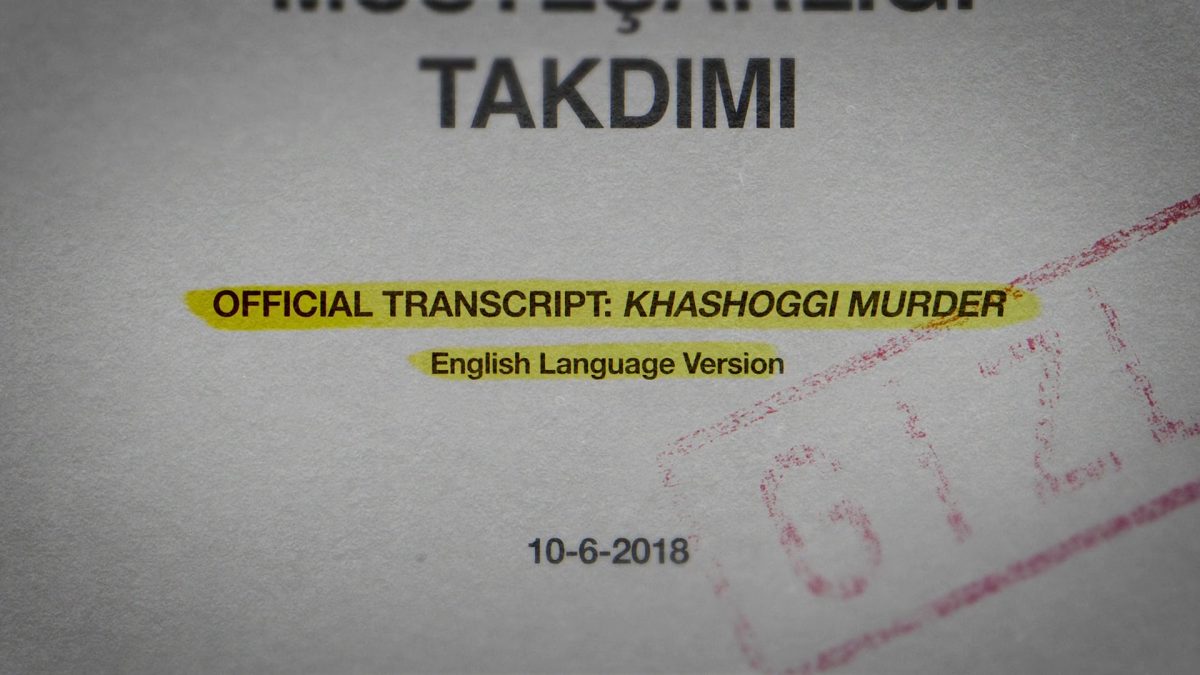
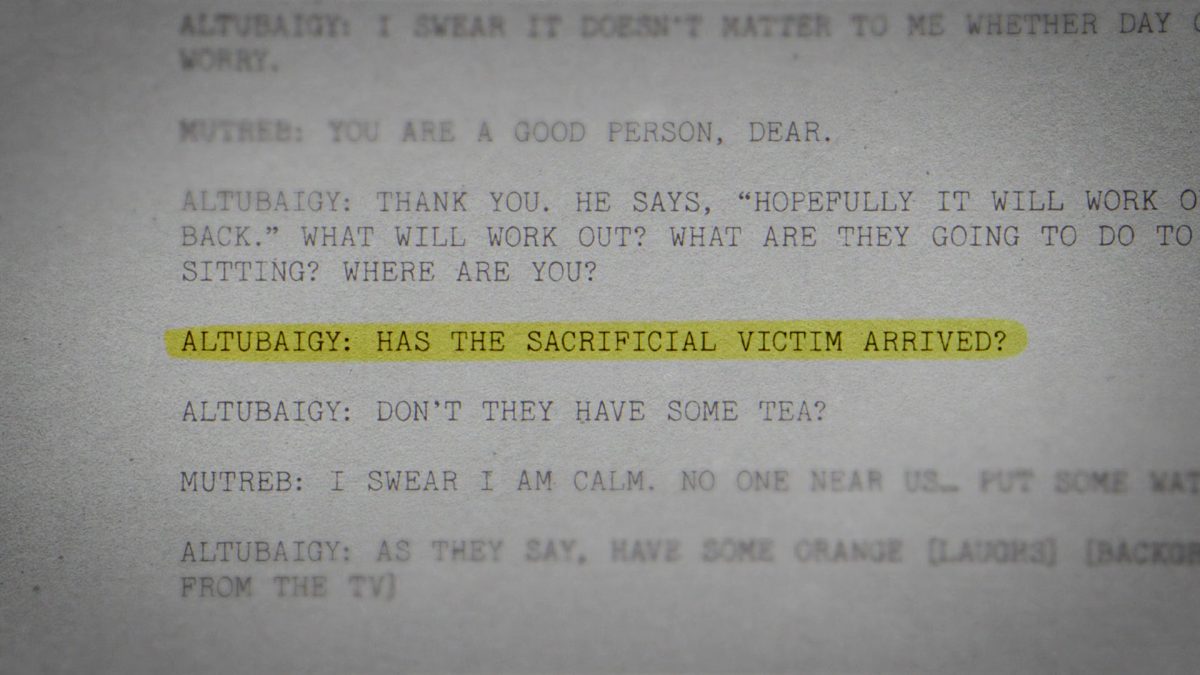
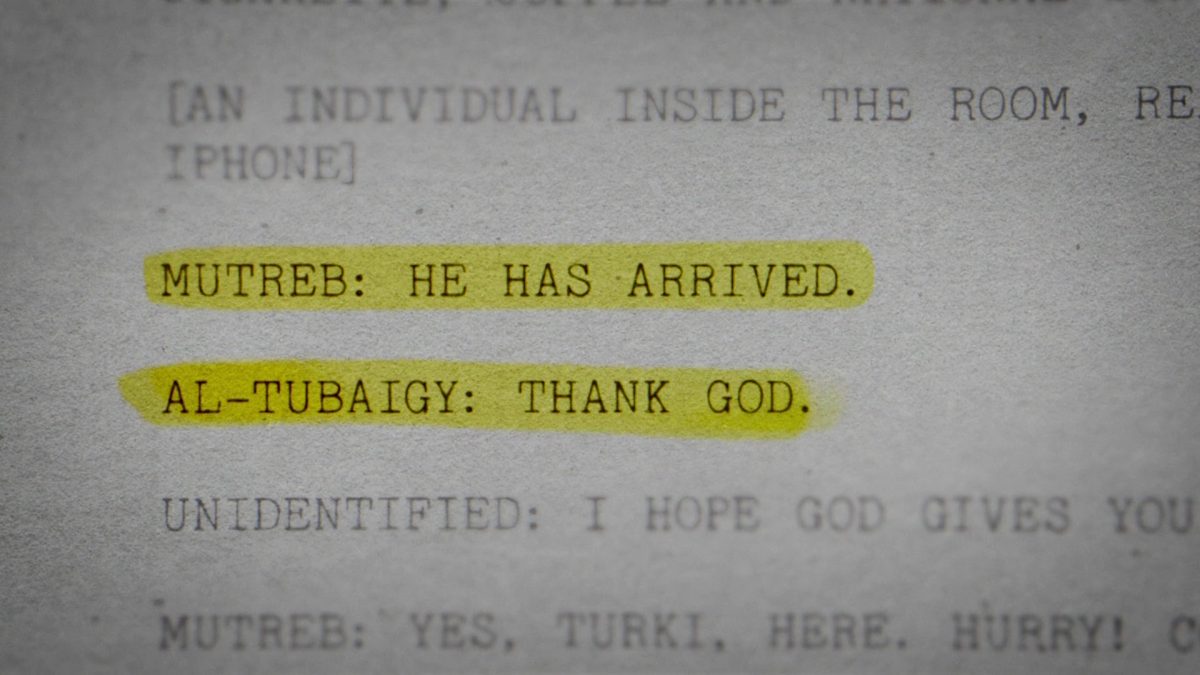
IRFAN [IN TURKISH]: After he entered the consulate, between 1:14 p.m. and 1:24 p.m., within the first ten minutes, his mouth is closed with someone’s hand and at this point he begins to scream. “You’re going to strangle me.” “You are going to kill me.” “I have asthma.” “Don’t do this” he repeats as more men subdue him. At this point he doesn’t stand a chance. Wheezing… Grunting… Those are the only sounds he can make as he’s being killed.
MALE REPORTER [IN ENGLISH]: We know from here that he entered this embassy and didn’t come out.
FEMALE REPORTER: …in Istanbul, seeking paperwork to marry his fiancée.
FEMALE REPORTER: His fiancée saw him go in at 1:00 p.m. and was still waiting for him after 1:00 a.m.
RECEP KILIC [IN ARABIC]: From the minute we heard from the media that he was missing, we were convinced that we needed to get in there to investigate. We were waiting. However, due to international laws, we knew that we needed their approval.
INTERVIEWER [IN ENGLISH]: So, to back up… The Saudis, they wouldn’t let you in?
RECEP KILIC [IN ARABIC]: Yes, they wouldn’t let us in.
MALE REPORTER 1 [IN ENGLISH]: Saudi officials have denied that a prominent Saudi journalist is in their custody.
MALE REPORTER 2: Jamal Khashoggi has reportedly been missing for more than 24 hours. Turkey says that they will be cooperating with Saudi authorities to resolve the incident.
FEMALE REPORTER: The consulate said it had no comment when asked why he never came out.
[MALE REPORTERS SPEAKING IN ARABIC]
MALE REPORTER [IN ENGLISH]: Can you tell me what happened to Mr. Khashoggi? What happened to Mr. Khashoggi?
[CAMERA SHUTTERS CLICKING]
MALE REPORTER: Did you talk to him?
[CAMERA SHUTTER CLICKS]
[PEOPLE CHATTERING IN ARABIC]
MALE PRODUCER [IN ARABIC]: Ok, we’re gonna start.
JAMAL KHASHOGGI: Okay.
MALE PRODUCER [IN ARABIC]: Please, go ahead.
JAMAL: Jamal– [CLEARS THROAT] Jamal Khashoggi. Jamal Ahmad Khashoggi.
JAMAL [IN ARABIC]: Saudi writer and journalist.
PRODUCER [IN ARABIC]: Ok, go ahead please.
JAMAL: Right. Okay.
JAMAL [IN ARABIC]: I was raised in a generation that witnessed the displacement of the Medina people during WWI. I was crazy about history. My father, Ahmed Khashoggi, God rest his soul…
[LAUGHTER STARTS AS A CAT JUMPS ON JAMAL’S LAP]
[PEOPLE CHATTERING IN ARABIC]
[♪♪]
WADAH KHANFAR [IN ENGLISH]: I know Jamal very well. I know his innocence.
JAMAL [IN ARABIC]: You should keep that in the movie.
WADAH KHANFAR [IN ENGLISH]: Jamal has a smile which sometimes looks like a childish one. Very innocent. You feel that human element in him. He’s not Jamal the journalist, Jamal the politician, Jamal the activist. Whatever it is… It’s Jamal the human. Jamal always had that smile.
[♪♪]
JAMAL KHASHOGGI, INDIANA STATE UNIVERSITY, 1979
ROBERT: What year was that, Jamal, that you graduated?
JAMAL: Eighty-one. Yes.
ROBERT: Nineteen eighty-one? Business Administration degree from Indiana State. But since then, I’m happy to see from his biography, Jamal is a rara avis, at least in our society, full-time long-term professional journalist. He doesn’t seem tempted to be doing anything else.
WADAH [IN ENGLISH]: I knew about Jamal, of course, because I read his articles. For me, as a journalist, he resembles every beautiful ideal that journalism stands for. Especially in our countries, in our land, in Saudi Arabia.
INTERVIEWER: Saudi Arabia is a monarchy. I mean, the king has ruled that it should happen.
JAMAL [IN ENGLISH]: That is the wrong conception about Saudi Arabia, The king is not a dictator, he rules by consensus. And I’m sure the tide, eventually, will be won over by the reformists.
SERDAR ATAS [IN ENGLISH]: It is difficult to be a journalist in Saudi Arabia without the loyalty of the ruling elites.
PRINCE TURKI AL FAISAL, FORMER INTELLIGENCE DIRECTOR, SAUDI ARABIA
SERDAR ATAS [IN ENGLISH]: And when we talk about Saudi Arabia, you should know that it is a huge family business. So he was an insider. Internationally, kind of an overall face of the Saudi media.
JAMAL [IN ENGLISH]: We, in the Saudi media, we try our best to expand our boundaries. Of course, there are limitations.
SERDAR [IN ENGLISH]: In Western media, The United States of America, you have a free voice. Not in Saudi Arabia.
WADAH [IN ENGLISH]: When people say Jamal was part of the regime, I agree. Jamal was part of the institution. But in Saudi Arabia, journalists are tools of the regime, who are supposed to only write magnificent things about the government, and how wise the decisions are. They inherited this culture from the moment in the desert, when the poets used to come to the chiefs praising their wisdom, praising their policies. So the Saudis’ attitude towards journalism: You are writing for them.
OMAR [IN ENGLISH]: Jamal spent 30 years working for the government. But I had this feeling… Jamal is different, he’s way different than others. He was very polite when he was criticizing others. Me, you know, I’m 27 years old so I would be sometimes more offensive.
[♪♪]
INTERVIEWER: On Twitter?
OMAR: On Twitter. I was criticizing everything except the royal family. And he had to unfollow me. But I didn’t have a very huge audience. I was just a regular guy with hundred followers. That’s what saved me from being jailed directly.
RIYADH, SAUDI ARABIA
OMAR: That was until my father received a phone call from the authorities asking him to bring me to them. I went to the airport with my father. He was worried that I might be stopped. He hugged me and kissed my head and this is not usual in our tradition. I’m the one who’s going to kiss my father’s hand, his head to show respect. But this time he’s the one who did it. He was almost crying. It was difficult for him.
KING KHALID INTERNATIONAL AIRPORT, RIYAD, SAUDI ARABIA
INTERVIEWER [IN ENGLISH]: At that moment, that you left… Did you feel like you were leaving for good?
OMAR [IN ENGLISH]: Yes.
[♪♪]
[POLICE SIREN WAILING]
OMAR [IN ENGLISH]: When I came to Montreal, couldn’t speak English, not a word. I applied for political asylum. And then I started to raise my tone. I also started to build an audience. People started to hear my voice, frequently. And big names, public figures started to retweet my tweets. I started to criticize the royal family, the religious people, the King himself. Because in Saudi Arabia, if you’re talking about everything except the royal family… You’re not talking politics.
MALE REPORTER: The Saudi King’s jet carries its own royal staircase. Waiting at the bottom of it at Gatwick Airport this morning were the Prince and Princess of Wales. The king of one of the most closed societies in the world looking at ease in this more open one.
JOHN BRENNAN: The Saudi government and the monarchy has evolved significantly over the last 80 years, basically, since the kingdom was founded. The founder of Saudi Arabia, King Abdulaziz, had about 37 sons or so. And political power, as well as economic power, was distributed among those sons.
MALE NARRATOR: A pivotal country saw a lavish welcome for the man who controls nearly half the world’s oil reserves.
JOHN: Once King Abdulaziz died, the crown was passed through to his son, to his son, to his son.
OMAR: King Salman became the king and the game has completely changed. We’re not dealing with the same people.
SCOTT PELLEY: A new king reigns in a country with enormous sway over the world economy and the war on terror.
[♪♪]
JOHN: While in the past, the king really had to rely on a lot of his brothers in order to govern the kingdom. When they passed from the scene, more and more powers concentrated in the hands of his heirs, and that’s the situation we have today.
[♪♪]
OCTOBER 15, 2018
13 DAYS AFTER JAMAL KHASHOGGI’S MURDER
[METAL DOOR CREAKING]
[PEOPLE CHATTERING]
[CAMERA SHUTTERS CLICKING]
FEMALE REPORTER: Saudi Arabia has granted Turkish investigators permission to enter and search.
[IN TURKISH] Only on October 15th were we able to search, examine and collect and find traces of evidence.
RECEP [IN TURKISH]: The evidence we have gathered suggests it happened in the meeting room.
[♪♪]
ISTANBUL POLICE FOOTAGE
COURTESY TURKISH INTELLIGENCE
[CAMERA SHUTTER CLICKS]
RECEP [IN TURKISH]:
[IN ENGLISH]
[IN ARABIC]
[IN ENGLISH]
RECEP [IN TURKISH]: It’s a private room. We went inside. You know how sometimes, you go somewhere and think it smells oddly clean?
SAUDI OFFICIAL [IN ENGLISH]: I don’t know what that is.
RECEP [IN TURKISH]: We don’t know what it is either, so we have to take a sample to find out.
POLICE INTERPRETER: They don’t know either, so they want to take a sample.
SAUDI OFFICIAL [IN ENGLISH]: We check with the General (Consul General), okay?
POLICE INTERPRETER: Everything we do, ask General first. Before taking samples, we’re just notifying you where they are taking samples.
RECEP [IN TURKISH]: I wish you could’ve seen the face of the Saudi official. Because he was surprised, as if saying, “What is this?”
[FLASH BULB WHIRS]
[♪♪]
RECEP [IN TURKISH]: They didn’t choose that conference room randomly. The fact that room was chosen specifically, led us to the conclusion that they were in contact with their country. Before, maybe during and after the incident. Someone may have easily watched everything that went on, even given orders.
[♪♪]
[CAR HORNS BLARING IN DISTANCE]
[BOAT HORN BLARES]
[SEAGULLS SQUAWKING]
AYMAN NOUR, FORMER EGYPTIAN PRESIDENTIAL CANDIDATE [IN ARABIC]: Jamal and I were friends for 35 years. I competed against Mubarak in the first presidential election in the history of Egypt. After that, I served five years in prison. I have always been a dissident against the regimes in my country and in many Arab countries. Jamal was more of a reformer than a dissident.
[CROWD CLAMORING]
[ALL CHANTING IN ARABIC]
AYMAN NOUR [IN ARABIC]: But Jamal’s biggest turning point in his life was the Egyptian January Revolution.
JANUARY 25, 2011
CAIRO, EGYPT
[CROWD CLAMORING; FIREWORKS POPPING]
ALL [CHANTING ARABIC]: “The people demand the overthrow of the president!”
MALE REPORTER [IN ENGLISH]: This is history. Protesters forcing change earlier this year in Tunisia, now succeeding in forcing change in Egypt after nearly 30 years of Mubarak rule.
[CHEERING]
MALE REPORTER [IN ENGLISH]: That’s two Arab leaders in two months.
MAN [IN ARABIC]: Jamal came to see us in Tahrir Square, he was happy and participated with us, as if he was an Egyptian.
[♪♪]
FEMALE NEWS ANCHOR [IN ENGLISH]: Arab governments are watching closely, wary that a revolution might be headed to their country next.
[♪♪]
SERDAR [IN ENGLISH]: Jamal was very much inspired by the Arab Spring.
[PEOPLE CHATTERING]
SERDAR [IN ENGLISH]: But later the counter-revolutions had killed that hope.
[GUNFIRE]
JULY 3, 2013
CAIRO, EGYPT
[CROWD CLAMORING]
MALE REPORTER [IN ENGLISH]: The military’s crackdown on opposition in Egypt had resulted in over 14,000 people thrown in jail.
[DISTANT POLICE SIREN BLARING]
SERDAR [IN ENGLISH]: Who is funding these anti-democratic forces? Anti-change forces? Undermining the legitimate demands of the people?
WADAH [IN ENGLISH]: Jamal knows it is the wealth of Saudi Arabia leading the counter-revolutions against the Arab Spring. He condemned it.
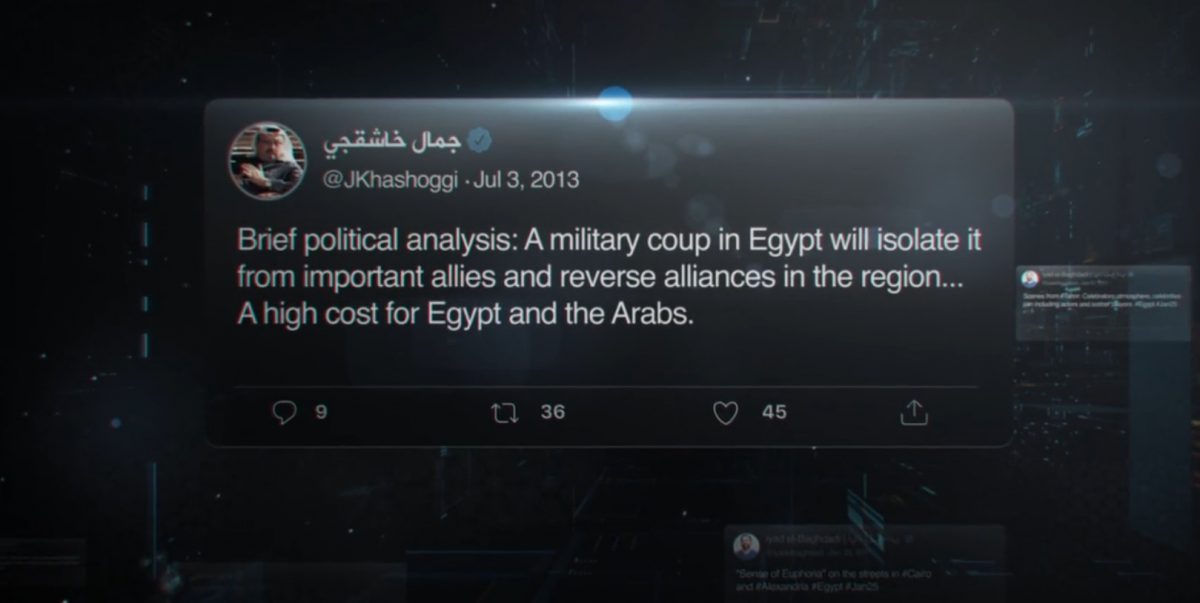
[GUNFIRE]
JAMAL [IN ENGLISH]: Arab spring is a true phenomenon. In Egypt, in Jordan, in Morocco, everywhere there is an election. We received the people’s vote.
[AMBULANCE SIREN BLARING]
JAMAL [IN ENGLISH]: So how could Saudi Arabia continue to have a proper Middle Eastern policy that will lead to bringing peace in the Middle East without recognizing and respecting that segment of the people in the Middle East?
[♪♪]
OSLO, NORWAY
IYAD EL-BAGHDADI [IN ENGLISH]: John, good morning. I’m on a new phone. Uh, this is temporary. Let’s not exchange sensitive information until you arrive. But this is how to get in touch with me until then.
I tell people that Jamal and I were not supposed to be friends. I mean, I’m a pretty well-known dissident. But in 2012, he started following me on Twitter. He was very interested in social media in terms of the phenomena.
[♪♪]
IYAD EL-BAGHDADI [IN ENGLISH]: Saudi Arabia has an unprecedented online population. We know that there’s no free speech. So, Twitter became the parliament of the Arabs.
OMAR [IN ENGLISH]: When you compare to the States, 2 out of 10 are using Twitter. In Saudi Arabia, 8 out of 10.
INTERVIEWER: 80% of the country is on Twitter.
OMAR [IN ENGLISH]: Yes.
INTERVIEWER: And so, if they can essentially control Twitter…
OMAR [IN ENGLISH]: They can control the local narratives. They can control the public.
[♪♪]
MALE NEWS ANCHOR [IN ENGLISH]: …already proposed a series of economic and social changes under the banner of Saudi Vision 2030. The highly anticipated 2030 Vision seems to radically change the image of the Kingdom.
CHRISTIANE AMANPOUR: The man behind it all, Crown Prince Mohammed bin Salman, is regarded as a progressive leader, touting social and economic reforms.
CROWN PRINCE MOHAMMED BIN SALMAN [IN ARABIC]: I believe the Middle East will be the new Europe.
AMANPOUR: And critics say, MBS, as he’s known, is also power hungry.
JOHN BRENNAN: I had met Mohammed Salman when he was Chief of Staff to his father. We understood that he was very ambitious, a very impatient, and a favorite son. He pushed aside King Salman’s half-brother, Prince Muqrin and the Crown Prince, Muhammad Nayef.
FEMALE REPORTER 1: He’s being described as the power behind the throne, and has had a hand in nearly everything in the Kingdom.
FEMALE REPORTER 2: He is emancipating women, introducing music and cinema, and cracking down on corruption.
OMAR [IN ENGLISH]: Jamal believed in Vision 2030. He was supporting MBS.
JAMAL [IN ENGLISH]: Prince Mohammed bin Salman is promising to eradicate extremism in Saudi Arabia and we need that and he is promising to eradicate corruption and we need that. But he’s doing all of those positive things in the midst of silencing other opinions.
[AIRPLANE ENGINE WHIRRING]
FEMALE NEWS ANCHOR: This is an American first, never before has a president set foot on Saudi soil for his first trip abroad.
WADAH [IN ENGLISH]: The most defining moment for Mohammed bin Salman and Jamal was actually the arrivaliof Trump.
PRESIDENT TRUMP: America will not seek to impose our way of life on others, but to outstretch our hands in the spirit of cooperation and trust.
SHANE HARRIS, INTELLIGENCE AND NATIONAL SECURITY JOURNALIST, THE WASHINGTON POST: What my sources told me was the Saudis and Mohammed bin Salman, in particular, were trying to forge a relationship with people in The White House, and most particularly with Jared Kushner, who’s the President’s son-in-law and Senior Advisor.
WADAH [IN ENGLISH]: Mohammed thought that this is the golden moment where he can crown himself as the representative of the American might and power in the Middle East.
PRESIDENT TRUMP: Three billion dollars, $533 million, $525 million. That’s peanuts for you. You should’ve increased it. Eight hundred…
OMAR [IN ENGLISH]: Jamal was criticizing Donald Trump.
@JKhashoggi
Trump tweets from time to time that he is “protecting us” and that we have to “pay” to keep this protection!! Protecting us from who?
[♪♪]
OMAR [IN ENGLISH]: He said that he’s milking the country.
WADAH [IN ENGLISH]: The regime got very angry with Jamal. He continued to be outspoken.
JAMAL [IN ENGLISH]: I’m sure Saudi Arabian officials were caught off-guard by the election of Mr. Trump. Now… I think all of us, as Saudis, should worry about it.
JAMAL [IN ENGLISH]: I strongly believe that the struggle for democracy in the Middle East are the core of all problems.
WADAH [IN ENGLISH]: Jamal was always on the edge. He knows what red lines he should not cross in his coverage. But he will do the maximum that he could. Sometimes he will misjudge.
MALE REPORTER [IN ARABIC]: The Ministry of Foreign Affairs announced that the writer Jamal Khashoggi does not represent the country in any capacity.
WADAH: When Jamal heard that statement, he was shocked. It was a warning.
[♪♪]
IYAD: By 2017, Jamal had an enormous audience. MBS put together a plan to control the public sphere. Saud al-Qahtani, MBS’s right-hand man, managed to implement this plan… creating Twitter army of trolls to control the freedom of speech.
MALE REPORTER: Al-Qahtani worked behind the scenes as an enforcer for the Crown Prince.
FEMALE REPORTER: Qahtani was known for targeting those who spoke out against Riyadh on Twitter.
WADAH [IN ENGLISH]: Jamal received a call from Saud Al Qahtani, saying that, “I have instructions from above that you should not do anything from now on.” Don’t tweet, don’t write, don’t do anything.
JAMAL [IN ENGLISH]: I was ordered to shut up.
[TROOPS CHANTING]
JAMAL [IN ENGLISH]: This is scary. This is not the Saudi we want.
WADAH [IN ENGLISH]: During that period Jamal phoned me. He said, “I am suffocated in Saudi Arabia.”
[CAMERA SHUTTERS CLICKING]
JAMAL [IN ENGLISH]: Whatever narrow space I had was getting narrower.
MALE NEWS ANCHOR [IN ARABIC]: The French magazine Le Monde has confirmed that three Saudi Twitter celebrities have been arrested over the past few days.
MAN 1: They’re not dissidents. The people were not even being dissidents.
MAN 2: These were the thought-makers, the opinion-makers of Saudi society. Writers and intellectuals.
OMAR [IN ENGLISH]: Essam Al-Zamil was one of these people who criticized him. Salman Al Odah, he’s a cleric, he was silenced. They started to hunt down every single dissident, every single activist.
AYMAN [IN ARABIC]: Jamal, he left Saudi Arabia in a quick moment. He decided to travel instantly. He didn’t talk to anybody.
[♪♪]
ISTANBUL POLICE FOOTAGE
COURTESY TURKISH INTELLIGENCE
[MEN CHATTERING IN TURKISH]
RECEP [IN TURKISH]: We brought in cadaver dogs. That whole area was searched. He didn’t vanish into thin air. We knew that some vehicles left the consulate and went to the Consul General’s residence on that day.
IRFAN [IN TURKISH]: Based on our findings, Jamal Khashoggi’s corpse was moved to the Consul General’s residence. This I’m sure of.
RECEP [IN TURKISH]: On the floor of the garage area, we saw a manhole cover. When we lifted this cover, we discovered a well. We wanted to drain the well to investigate. But the Saudi Arabian officials next to us… They said “No. Due to our predetermined agreement, you cannot work here.”
SAUDI OFFICER [IN ARABIC]: It’s a… an oven.
RECEP [IN TURKISH]: In the pool area, there was what we call a tandoori oven, or a well oven about 1.5, 2 meters deep.
IRFAN [IN TURKISH]: The Istanbul Police discovered that on the night of Jamal Khashoggi’s murder, the consulate ordered 70 lbs of meat at a well-known restaurant in Istanbul.
RECEP [IN TURKISH]: If a body is burned there, any potential DNA evidence is instantly eliminated.
IRFAN [IN TURKISH]: We think that this order of meat was used to mask the smell of a burning corpse.
[♪♪]
BRUSSELS, BELGIUM
[PEOPLE CHATTERING]
[WOMAN SPEAKING INDISTINCTLY OVER P.A.]
FEBRUARY 19, 2019
FOUR AND A HALF MONTHS AFTER JAMAL KHASHOGGI’S MURDER
HATICE CENGIZ, FIANCÉE OF JAMAL KHASHOGGI [IN ENGLISH]: We are together today and tomorrow, right?
MALE INTERVIEWER [IN ENGLISH]: Today, tomorrow and then.. I come to Istanbul on Thursday.
HATICE: Ok…
MALE NEWS ANCHOR: For the first time, we are now hearing from the fiancée of Washington Post reporter Jamal Khashoggi…
…has called on U.S. lawmakers to hold Saudi Arabia accountable.
His fiancée says she’ll fight to ensure everyone who is responsible for his death is brought to justice.
EUROPEAN UNION
EXECUTIVE OFFICES
[REPORTERS CLAMORING]
HATICE [IN TURKISH]: It’s all still like a strange dream.
MAN 1: Yeah. I need 10 minutes.
MAN 2: Yes.
HATICE [IN TURKISH]: Because none of this is familiar to me.
WOMAN: We need to cross the opening…
MAN: Absolutely. But let’s go…
[CAMERA SHUTTERS CLICKING]
HATICE [IN TURKISH]: The cameras. Media… The press… None of these things are a part of my life.
MAN 1: If we can just announce the press briefing. And is there any questions? If there’s questions, we cannot…
[REPORTERS CLAMORING]
HATICE [IN TURKISH]: I still wonder when all of this will end, when I will be a normal person again. I don’t know.
[SEAGULLS SQUAWKING]
HATICE [IN TURKISH]: Jamal and I met in a conference about the Middle East.
MAY 6, 2018
ISTANBUL, TURKEY
HATICE [IN TURKISH]: Back then I thought to myself, how lonely he looks.
[AUDIENCE APPLAUSE]
JAMAL [IN ENGLISH]: Saudi Arabia is a one-hundred-year-old monarchy. And monarchies don’t like change.
[♪♪]
HATICE [IN TURKISH]: When I started using social media four or five years ago, Jamal was one of the people I was following.
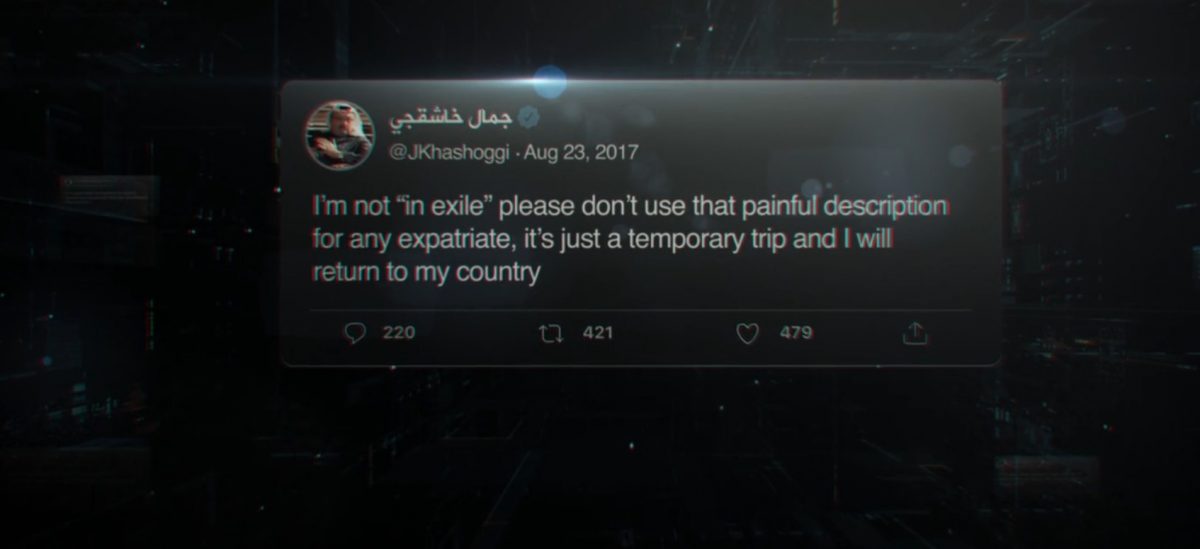
HATICE [IN TURKISH]: His radical decision to move to another country caused me to follow him more closely. I was a young academic, a wide-eyed researcher. The idea to meet him, ask him for an interview, happened spontaneously.
MAY 6, 2018
AUDIO PROVIDED BY HATICE CENGIZ
HATICE [IN TURKISH]: I don’t consider you as a dissident, not at all. Because a dissident is someone who doesn’t like his country.
JAMAL [IN ARABIC]: I am worried. Any ruler who values only his own opinion leading his country towards a problem. Because having one person make all the decisions, it’s always wrong.
HATICE [IN TURKISH]: I didn’t think that this was the start of something a romantic relationship. When I look back it seems more meaningful, because… Knowing Jamal meant losing him at the same time.
[♪♪]
WADAH [IN ENGLISH]: One day, I received a message on my telephone. Jamal saying, “I am in Washington, I am going to stay here.” It was about one month of his departure from Saudi Arabia. And he was.. devastated by the experience. His wife had to divorce him and he said “I don’t blame her because she is under pressure from the regime. But I left my children, I left my family. Did I really make the right decision?”
INTERVIEWER [IN ENGLISH]: So he had reached out to you?
OMAR [IN ENGLISH]: Yes. I gave him my number and he called. He said “I just wanna be in touch with young activists like you.”
OCTOBER 12, 2017
AUDIO PROVIDED BY OMAR ABDULAZIZ
OMAR [IN ARABIC]: Peace be upon you, Mr. Jamal, how are you? If you allow me, there is a group for activists from the Arab Gulf. The group is on the app called “Telegram.” And I suggested that your presence would honor us in the group.
[♪♪]
“Is it ok if I invite Jamal Khashoggi to the group?”
“Which side is he on?”
OMAR: I said, “But here’s the thing. Not every single one of them trusts you.”
“Can he be trusted?”
“Guys don’t forget he worked for the government for 30 years.”
OMAR: You are saying that Jamal might be a spy.
“I don’t know, we don’t want to be exposed.”
“No, we cannot trust him.”
“He’s too dangerous.”
MOHAMED SOLTAN: I met Jamal in Washington after a manor connected me to him. I think we bonded a lot over food. Heh. Like most, I guess, Middle Easterners. He told me that he had moved to the U.S. and that he was all alone and didn’t know what was happening for the first time in his life at age 60. I remember he started tearing up, telling me how his wife whom he had loved very, very much, she wasn’t okay with it. She– Nobody was. His kids weren’t okay with it. Nobody was okay with it. Everything was left behind and the country– 60 years of his life– everything. He struggled with it every single day. In Saudi Arabia, he was the biggest insider. And then, all of a sudden, he finds himself on the outside, on the very much outside.
[♪♪]
I felt, like, for him to settle emotionally, mentally, physically, he needed to write again.
JAMAL [READING IN ENGLISH]: It was painful for me several years ago when several friends were arrested. I said nothing. I didn’t want to lose my job or my freedom. I worried about my family. I have made a different choice now. I have left my home, my family and my job, and I am raising my voice. To do otherwise would betray those who languish in prison.—The Washington Post, September 18, 2017.
[♪♪]
JAMAL [IN ENGLISH]: I want you to know that Saudi Arabia has not always been as it is now. We Saudis deserve better.
DAVID IGNATIUS, ASSOCIATE EDITOR, THE WASHINGTON POST: I was a friend of Jamal Khashoggi’s for about 15 years. When he came to The Washington Post, he was transported. This was something that he had dreamed about. You have to understand what it’s like to be a journalist in Saudi Arabia. Every time you try to say something that’s tough-minded, you get fired. He was the sort of person that just couldn’t take a pass. If he felt something, he just insisted on writing it. I watched him get fired from a series of jobs in Saudi Arabia, each time because he just couldn’t stop himself from saying what he thought was true.
JAMAL [IN ENGLISH]: Unfortunately the government treated me as if I shot the King, God forbid, and I ran away. As if I am a traitor. They started attacking me in the media. They started attacking me in the social media. With all kind of slanders.
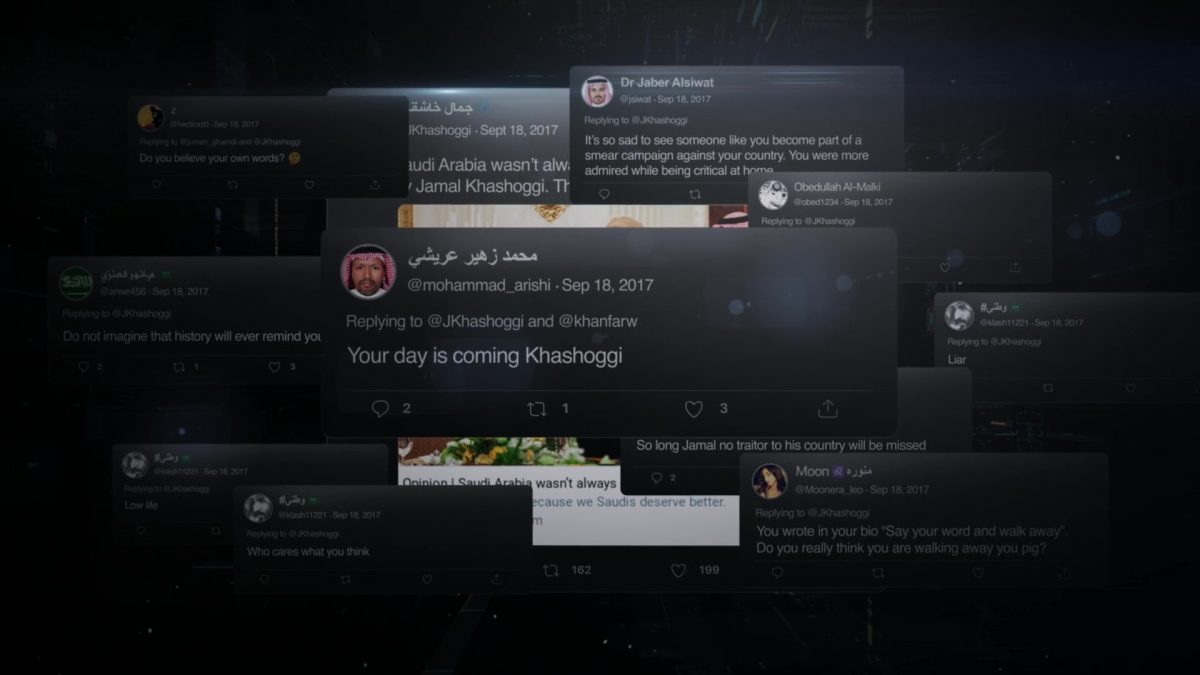
OMAR [IN ENGLISH]: Your voice matters. Your words are important. I learned that from Jamal. He does not have a weapon. He’s just using his words. And that shows us how weak they are. So we have to remind our people about what’s really going on in the country.
I decided to launch a YouTube show. Basically it was the first Saudi show that criticizes the royal family and the king, and his sons. That was something new for the people.
OMAR [SPEAKING ARABIC]
[IN ARABIC] All we want from you this time is to like and subscribe.
OMAR [IN ENGLISH]: But having an opinion in Saudi Arabia is a problem. And having an opinion with an audience, a huge audience, is a crime.
OMAR [IN ARABIC]: Mohammed bin Salman is going to oppress some of the princes. He will blackmail them. He will try to take money from them. He will try to obtain most of the money and treasures they possess!
NOVEMBER 4, 2017
RIYAD, SAUDI ARABIA
MOHAMMAD BIN SALMAN [IN ARABIC]: I can confirm to you that no one will survive. Anyone involved in a corruption case, no matter who he is, he will not survive!
[CNN Live] We’re seeing a truly historic upheaval unfold right now.
[Fox News] A royal purge in Saudi Arabia.
FEMALE REPORTER: King Salman ordered the creation of a new anti-corruption committee headed by son, Prince Mohammed Salman.
IYAD: November of 2017, Mohammed Bin Salman basically rounds up the most powerful people in Saudi Arabia, puts them in the Ritz in Riyadh, basically a five-star prison, and shakes them down for a lot of money, over a $100 billion.
FEMALE REPORTER: Mohammed Bin Salman ordered the arrest of powerful princes, ministers, and investors. Some are his rivals in the royal family.
OMAR [IN ENGLISH]: Maybe he felt that this is the best way to help the country. Maybe. Or maybe it’s all about controlling everything in the country.
[SOLDIERS YELLING CHANT IN ARABIC]
FEMALE REPORTER: Is this also about sending a message that, as we say in America, there’s a new sheriff in town?
MOHAMMAD BIN SALMAN [IN ARABIC]: Absolutely. Absolutely.
[JET ENGINE REVVING]
JAMAL [IN ENGLISH]: I’m very much supportive for his reforms, for his social reforms. But at the same time he doesn’t need to make his people fearful of him. Sometime, I myself, even though I’m in Washington, I go quiet because… It’s just, there is so much intimidation around me.
IYAD: Jamal was starting to realize that there’s little he can do for his country from his position other than to write.
SERDAR: Jamal Khashoggi was kind of a black box of the ruling elites in Saudi Arabia. And it was scary for the Saudi administration. A man with that much deep knowledge? In Washington D.C.? They could not discredit him. He’s not going to be imprisoned and he’s not going to be silenced.
[DEBATE ON ALJAZEERA]
It is easy to sit and say we need, particularly in front of American audience, we need more freedom, we need more– these are golden things. Everybody loves them.
[ALL ARGUING]
ALI: You have to be practical.
JAMAL: I’m not asking for democracy, I’m asking for people to be allowed to speak. This is– I’m asking for the minimum.
WADAH [IN ENGLISH]: He became a speaker everywhere. At one of the conferences in Istanbul we had a conversation. He said “I’m lonely.” So, I said, “You need someone with you. At this age, definitely. Everyone does.”
TURAN KIŞLAKÇI, PRESIDENT, TURKISH-ARAB MEDIA ASSOC. [IN ENGLISH]: In Muslim world, if you want to meet a girl, you also bring your friends, and girl will come with her friends and you will meet each other. Jamal took me as his friend, and Hatice came with her friend.
HATICE [IN TURKISH]: We sat and talked, ate food, went to cafes, walked around Istanbul. He started telling me about his life, his private life. Jamal checked his watch. He said, “I’m about to miss my flight. There’s not much time left.” Then he said, “I actually wouldn’t mind if I missed my flight.” It was then that I understood something was starting. He said, “I’ll come back soon.”
OMAR [IN ENGLISH]: Jamal was starting his new life. He told me that “I’m settled here… the States. Everything is okay.”
[♪♪]
MONTREAL, CANADA
OMAR [IN ENGLISH]: That March 2018, I received a phone call from two representatives from the Saudi government. And they told me that they have a message from MBS.
INTERVIEWER [IN ENGLISH]: Two guys… What are their names?
OMAR [IN ENGLISH]: Malek and Abdullah. They said that MBS really likes you, watches your videos, and MBS wants you to come back home.
INTERVIEWER [IN ENGLISH]: And you recorded everything?
OMAR [IN ENGLISH]: Yes. Since day one.
MARCH 10, 2018
AUDIO PROVIDED BY OMAR ABDULAZIZ
[IN ARABIC] Abdullah: Omar, MBS said, “First of all this is Omar’s country, and nobody can stop him from entering his country. Omar is under my protection.” “Tell him: You are under Bin Salman’s protection.”
OMAR [IN ENGLISH]: Then, a few weeks later he said “We want to come here to Montreal. We will discuss things with you. But we want one of your brothers to be with us.”
INTERVIEWER [IN ENGLISH]: They come to Montreal with your brother?
OMAR [IN ENGLISH]: Yes. My brother, Ahmed.
APRIL 11, 2018
AUDIO PROVIDED BY OMAR ABDULAZIZ
[IN ARABIC] Abdullah: [laughs] You know, your brother Ahmed is an interesting character. He’s really nice, but between us… Sometimes I don’t think he understands the magnitude of the situation.
OMAR [IN ENGLISH]: Jamal. He warned me. He said, “You don’t have to meet them in private places. Just meet them in public places. Choose the restaurants, the cafes. Just be careful.”
[♪♪]
INTERVIEWER [IN ENGLISH]: Who is Malek? Who is Abdullah? And why were they the ones to contact you, to try to bring you back?
OMAR [IN ENGLISH]: Abdullah Aljuhaimi, he is a lawyer. But Malek Alrougui, he is a TV host at MBC network. They used Malek to try to convince me. “You can do the same thing like him when you go back to Saudi. You might have your own talk show there. You can be the voice of the youth of Saudi Arabia.”
[IN ARABIC] Abdullah: There are two scenarios. A scenario where Omar returns home, and Omar benefits. Now the country has benefited a lot because Omar is working in its media outlets and platforms. The second scenario Omar goes to jail.
OMAR [IN ENGLISH]: They started to insist. He said, “Why don’t you at least go to the embassy and get your passport renewed?”
INTERVIEWER [IN ENGLISH]: But you applied for asylum in Canada.
OMAR [IN ENGLISH]: Yes. I didn’t need to renew my Saudi passport. I have Canadian documents.
MAY 15, 2018
AUDIO PROVIDED BY OMAR ABDULAZIZ
[IN ARABIC] Malek: Omar… The Saudi Embassy… is waiting for you to give the green light to issue your return ticket.
OMAR [IN ENGLISH]: Jamal told me, “No, no, no, no. You don’t have to do that. You don’t have to go to the embassy.” Then I told them “No. That’s not going to happen.” So they went back to Saudi.
INTERVIEWER [IN ENGLISH]: And how about your brother?
OMAR [IN ENGLISH]: One month later, I learned that my brother Ahmed and 23 people of my friends. had been arrested. They’re using them as a tool just to silence me.
JULY 14, 2018
AUDIO PROVIDED BY OMAR ABDULAZIZ
Abdullah: You continue to tweet from your personal account and this will harm everyone. Especially your brothers. And we don’t wish them that harm. Absolutely not.
Omar: You promised me MBS said, “Under his protection. What kind of protection is locking up my brothers and friends? What honor? What honor?! What decency for a man to do such a thing?! He who does such a thing doesn’t have honor and his word means nothing. Nothing can stop him.
JAMAL [IN ARABIC]: Tell me about your dream, my love..
SEPTEMBER, 2018
VOICEMAIL FROM JAMAL
AUDIO RECORDING PROVIDED BY HATICE CENGIZ
“This feeling that you have really touched my feelings. Makes me anxious to see you in these following days, as soon as possible.”
HATICE [IN TURKISH]: He told me he was unhappy in the US. He suffered from a deep loneliness.
TEXT MESSAGES FROM SEPTEMBER 7, 2018
Jamal: “In the morning I wake up heavy from nightmares of people around me all night long. I wake up depressed, with you this will all go away.”
Hatice: “I feel you deserve the best.”
Jamal: “I thank you for being in my life. For real, it brings me joy. And I want to make you happy.”
HATICE [IN TURKISH]: I’ve never had something where our hearts and ideas were one before. Jamal asked me, “How can we take this to the next level? What do you think?” he said.
TURAN KIŞLAKÇI [IN ENGLISH]: He called me again, Jamal, “Now I decide to marry with Hatice.” “Oh,” I say, “It’s very nice. How good.” He told me, “But, I want one thing from you. You are my best friend, so you have to go and to talk with her father. And tell him we want to marry.”
HATICE [IN TURKISH]: My father was a little confused when he saw Jamal. I don’t know how he imagined him, but…
TURAN KIŞLAKÇI [IN ENGLISH]: Her father told me that he’s a… He’s an old man also. “My girl is younger.” So, I told him that.. In the love, you can’t differ between the age.
HATICE [IN TURKISH]: My father said, “You’ll have to shoulder that responsibility, you’re aware of this right? So do you think it’s worth it?”
SEPTEMBER, 2018
VOICEMAIL FROM JAMAL
AUDIO RECORDING PROVIDED BY HATICE CENGIZ
JAMAL [IN ARABIC]: You are intelligent and strong and you have a quality that will make you one of the best writers in Turkey, among the writers who know the Arab world. I love you because you are Hatice but I am attracted to you as a true intellectual and journalist.
HATICE [IN TURKISH]: I thought Jamal would do something good for humanity. And if I’m going to spend my life with someone, it can only be with someone like Jamal. I wanted to help him on his journey, to be by his side. Otherwise we all just live life. We’re born, we grow up, eat, sleep, travel… But who we do these things with is what gives life its meaning.
JAMAL [IN ARABIC]: I love you very much. See you, see you soon. Bye bye.
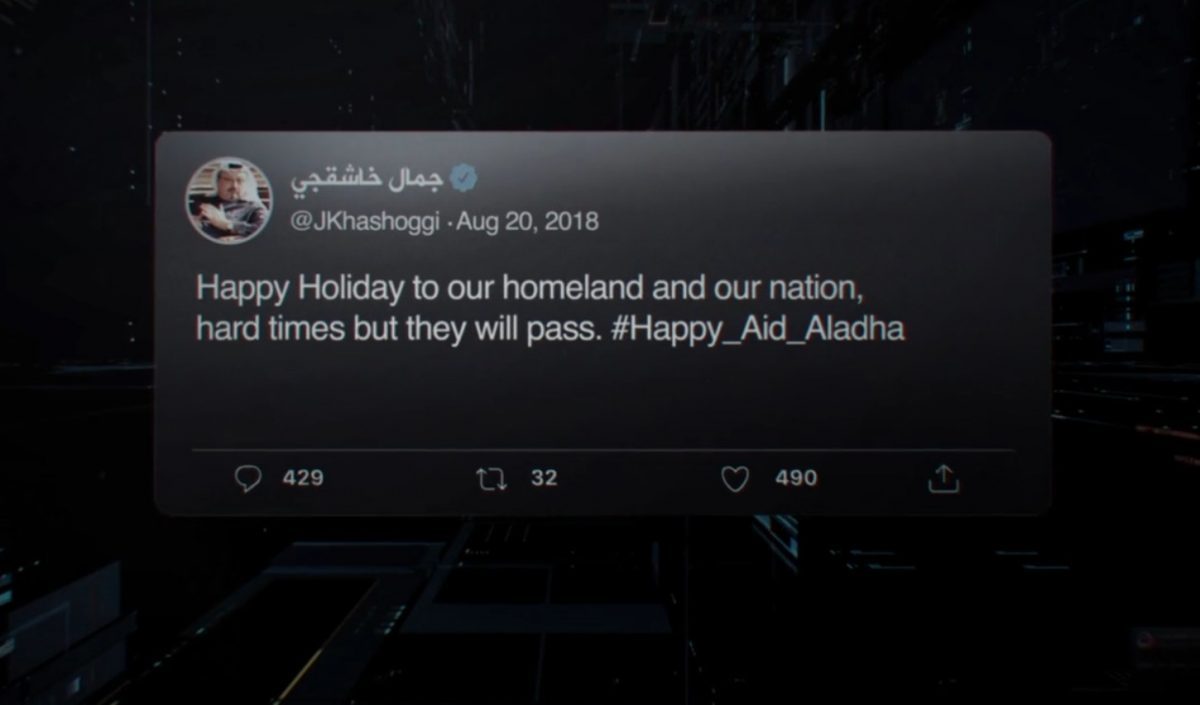
OMAR: In summer 2018, they were attacking him basically every single day, threatening him, trying to silence him.
[♪♪]
So Jamal felt the whole country was against him. And that was hurting him. He said, “Sometimes, I feel a lot like “I don’t wanna talk about anything. I don’t wanna expose my opinions.” I said, “No, no, no. You’re just a victim of what we call the Flies.” The government hired thousands of people. Every one of them using 10, 20 accounts. The moment they think critic of the government has posted, the flies swarmed, attacking with hundreds of negative replies. Within minutes, the tweet is covered in pro-government comments and hashtags, causing the person’s voice to be lost. Then each fly posts pro-government articles and hashtags, supporting MBS’s vision. And all of the fly can repost thousands of those tweets… forcing the state’s false narrative to the top of trending inside the country.
IYAD: This is the whole Twitter monster that Saud al-Qahtani created and you have the troll master himself on the top.
OMAR [IN ENGLISH]: When I started to explain that to Jamal, Jamal was surprised. You feel that there’s an army waiting for you in Medina City. But this is not the truth.
VOICEMAIL TO JAMAL
AUDIO RECORDING PROVIDED BY OMAR ABDULAZIZ
OMAR [IN ARABIC]: The Flies are a weapon, so it is necessary to use the same weapon or develop a better one.
OMAR [IN ENGLISH]: I said, “The best solution is… To create our own army.” I could get hundreds of volunteers from Saudi Arabia, Kuwait, Yemen, other countries. Each armed with two, three phones, generating hundreds of accounts.
[PHONE BUTTONS CLACKING]
But first we would have to make sure that they are protected. Anyone tweeting inside Saudi Arabia will be immediately identified since the government owns all this other networks. So to mask their identities, we must give them American or Canadian safeguards.
[INSECTS BUZZING]
To battle The Flies, we will call ourselves The Bees Army. We would organize the volunteers into groups of 40 or 50 bees, each reporting to a supervising lieutenant.
[♪♪]
Once I give the command, each lieutenant will tell their bee soldier a specific tweet or hashtag to protect. But we’re not going to use the same method. We’re not going to hire people to attack others, insult others, threaten others. We’re just going to tell the people what’s really happening in the country.
[BUZZING]
Give them the freedom to say whatever they want. The Flies will, of course, attack. But if our numbers are stronger, we will be able to rise above the propaganda machine… and finally install freedom of speech inside the Kingdom.
Jamal was really happy of the idea. He said, “Brilliant, I really like it.” And he said, “OK, do it.” I said, “Do it? I have no, I have no cash.”
A month later, Jamal transferred the first amount. And I bought the first few SIM cards. But, I told him, “You know, once you start working with us, it’s completely another game. You’re not just a journalist, you’re a dissident.”
HATICE [IN TURKISH]: He wanted to buy a flashy, large, expensive one. I said, “Jamal, I can’t wear any of these. Get me a plain, small ring.” Wherever the road might take us with whatever means we had. Our decision had been made, Jamal and I wanted to be married.
OMAR [IN ENGLISH]: Beginning of September, Jamal told me that he was planning to come to Canada. He said, “I have a few things to do in Turkey, then I’m coming to meet you. And we set the plan of The Bees together. That was our strategy.
HATICE [IN TURKISH]: We began looking for a home to call our own. And then Jamal bought one. It was beautiful. He bought himself a Lazy Boy chair. I can’t begin to tell you how happy it made him.
OMAR [IN ARABIC]:
[OMAR SPEAKING ARABIC]
[MAN RESPONDS IN ARABIC]
OMAR [IN ENGLISH]: I asked six or seven of my friends to create 5-10 accounts. We just wanted to show that we have the ability.
[♪♪]
HATICE [IN TURKISH]: I was so excited. What kind of a wedding could we have? I didn’t want a huge celebration.
OMAR [IN ENGLISH]: We are doing well. But we have to divide some phones into other cities.
OMAR [IN ARABIC]: Every group supervisor will be given a list of names they are tasked with defending. And tomorrow, we’ll give them a lesson in freedom.
[THUNDER RUMBLING]
HATICE [IN TURKISH]: There was only one procedure left for us to be officially married. He needed to secure a document proving he was unmarried from his consulate.
OMAR [IN ENGLISH]: Although I mobilized hundreds of Bee soldiers, we still were no match for The Flies.
OMAR [IN ARABIC]: Everyone is tweeting by himself. Combined we have millions of followers and we can’t have a single hashtag trending.
HATICE [IN TURKISH]: He was scared of being taken into custody or his passport getting confiscated. I told him, “We can go together.” He said, “Alright then, let’s give it a try.”
OMAR [IN ENGLISH]: Jamal told me, “You know it’s going to be a long journey.” “Just be patient.” So I kept building, trying new strategies. Focusing all our efforts on one hashtag, #what_do_you_know_about_the_bees?
[♪♪]
SEPTEMBER 28, 2018
FIVE DAYS BEFORE JAMAL KHASHOGGI’S MURDER
HATICE [IN TURKISH]: We went to the consulate around 10:30-11:00 a.m. They welcomed him respectfully. They told him they needed some time to prepare the document.
IRFAN [IN TURKISH]: As soon as Jamal Khashoggi enters the consulate, some serious plans are set in motion.
[PHONE DIALING OUT]
DATE: 09/28/2018
TIME: 13:22 – 20-06pm
[MEN SPEAKING IN ARABIC INDISTINCTLY]
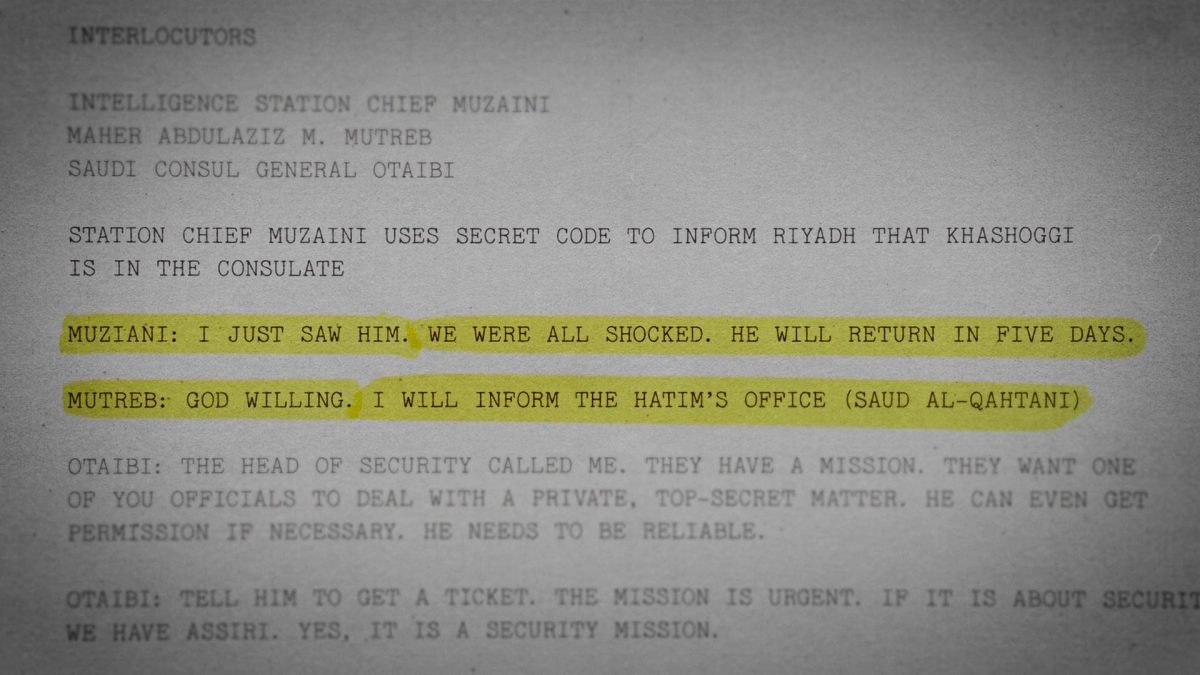
INTERVIEWER: So the moment he left, they called Saud al-Qahtani’s office?
IRFAN [IN TURKISH]: Yes.
HATICE [IN TURKISH]: After being treated so well, he left the consulate feeling relaxed and found me.
OMAR [IN ENGLISH]: He talked to me that day, on the 28th of September. He was happy.
[♪♪]
And that was the turning point. It started trending.
IRFAN [IN TURKISH]: Three or four days later, 15 Saudi Arabian state officials arrived.
AUDIO TRANSCRIPT
DATE: 10/01/2018
TIME: 21:48
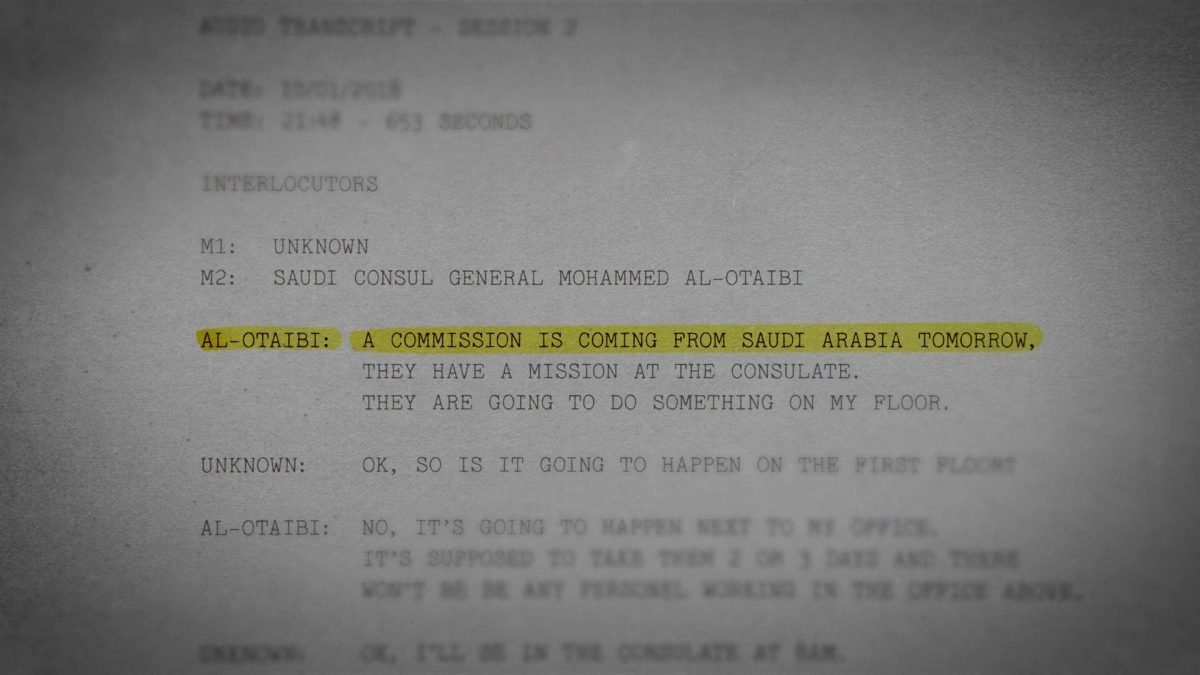
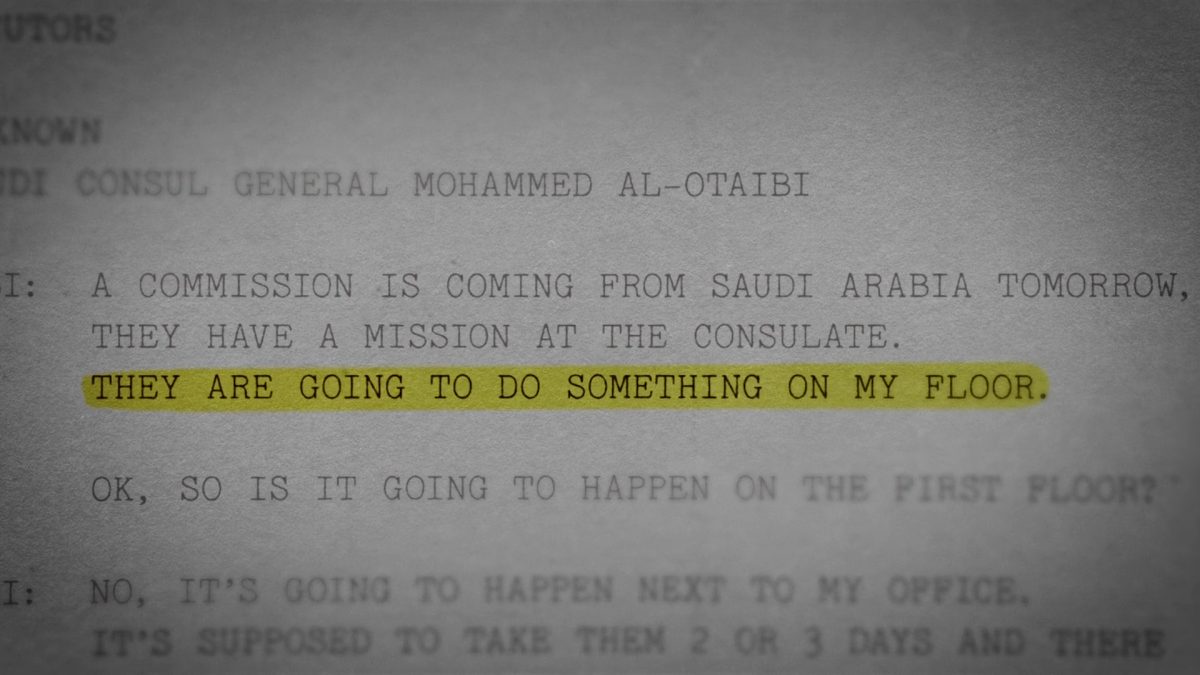
[MEN SPEAKING INDISTINCTLY IN ARABIC]
IRFAN [IN TURKISH]: Those who committed the murder only carried out the duties that were given to them.
OMAR [IN ENGLISH]: We hit number 20 in Saudi Arabia. Hours later number 10, and 7. Jamal was surprised, so then he started to tweet with us, he tweeted it. And then we did it. Number one trending in Saudi Arabia. And suddenly… he’s not answering. He’s just gone, disappeared.
OCTOBER 2, 2018
[♪♪]
WADAH [IN ENGLISH]: I received a call from Hatice. She said “I don’t know what to do. I am in front of the consulate. It is 5 p.m. now, and Jamal didn’t come out.” I mean this is very serious. “Okay, I will come back to you.” I switched off the phone quickly and I started calling.
[PHONE RINGS]
FATİH ÖKE, EXECUTIVE DIRECTOR, TURKISH-ARAB MEDIA ASSOC.: When I heard this, I was driving to my house. My friends calling me continuously. Come on, Jamal Khashoggi. It’s news. I called a couple of journalists based in Istanbul like Reuters, Al Jazeera, Washington Post.
FRED RYAN, PUBLISHER AND CEO, THE WASHINGTON POST: There’s really not a playbook for this type of situation, but we did know that we needed to act quickly. Within hours, we had a letter dispatched through the ambassador and through the United States government to the Crown Prince.
WADAH [IN ENGLISH]: I called people in government here in Turkey, a spokesperson for the president.
PROF. DR. YASİN AKTAY, AK PARTY CHAIRMAN ADVISOR [IN ENGLISH]: I was in the headquarters and the president also was there in a meeting. And I sent him a message.
FRED RYAN: I’d ask to meet with the Saudi ambassador of the U.S. who happens to be the brother of the Crown Prince. First response was that he was looking into the matter.
WADAH [IN ENGLISH]: I said, “Please. I sense something wrong happened here. Someone has to do something.”
INTERVIEWER [IN ENGLISH]: So you immediately…
YASİN AKTAY [IN ENGLISH]: Immediately, of course. Immediately. Yes, I immediately sent him a message.
[REPORTERS CLAMORING IN TURKISH]
PRESIDENT RECEP TAYYIP ERDOĞAN [IN TURKISH]: I’m still optimistic. I just hope that, we won’t be faced with an undesirable situation.
WADAH [IN ENGLISH]: I have started to feel by the end of that night that something serious has happened. But we never, never ever expected that he has been killed. Never!
FATİH ÖKE: First day, there was 10 or 12 journalists waiting outside. The day after, hundreds.
[REPORTER SPEAKING IN FOREIGN LANGUAGE]
He entered this embassy…
FATİH ÖKE: Two days later, 200.
We demand his immediate release if alive.
[IN ARABIC]: I’m certain that he is now inside the consulate. And we are waiting for his exit. Until he gets out… We will stay protesting out here until he gets out.
[IN ARABIC]: For me, personally, I was certain after the second day that Jamal would not appear again.
[IN ARABIC]: Jamal Khashoggi entered this place, and still until this moment, we don’t have any evidence indicating him exiting this place.
[♪♪]
OMAR [IN ENGLISH]: Everyone was talking about this story.
[POLICE SIREN BLARING IN DISTANCE]
OMAR [IN ENGLISH]: The authorities, the media. The rest of the world. I didn’t know what to do.
PRESIDENT RECEP TAYYIP ERDOĞAN [IN TURKISH]: The consulate officers cannot get away with this simply by saying “He left.”
PRESIDENT TRUMP: I am concerned about it. I don’t like hearing about it. And hopefully, that will sort itself out. Right now, nobody knows anything about it, but there’s some pretty bad stories going around. I do not like it. Thank you. I’ll see you. I’ll see you at 10:00.
[INDISTINCT CHATTER]
OMAR [IN ENGLISH]: I don’t know what your fate is right now.
[SPEAKING ARABIC]
OMAR [IN ENGLISH]: Only God knows.
[INDISTINCT CHATTER]
OMAR [IN ENGLISH]: And only God knows the size of my pain and my suffering…
[♪♪]
OMAR [IN ENGLISH]: …I will not let you down and I will not stop defending you. Always be well.
[♪♪]
FAHRETTİN ALTUN, COMMUNICATIONS DIRECTOR, REPUBLIC OF TURKEY [IN ENGLISH]: On that day, we found ourselves in uncharted territory. What happened to Jamal Khashoggi was so bizarre and unthinkable that we had to break the news of the murder not once, but twice. The first outlet we called decided against running the story, saying that the claim was “outlandish, unbelievable.”
[♪♪]
FEMALE REPORTER: To breaking news now, we are getting reports that Turkish authorities believe that prominent Saudi journalist Jamal Khashoggi has been killed.
Jamal Khashoggi–
Jamal Khashoggi–
[ALL SPEAKING IN FOREIGN LANGUAGES]
FRED: We heard one lie after another from the Saudi government.
Saudi Arabia has denied angrily that it abducted, harmed, or killed Khashoggi. Now suddenly, the country is admitting that Khashoggi did die inside that building.
FRED: We heard that he suffocated accidentally. We heard that there was a drug administered that had an unintended effect.
The government now says he died in a fist fight.
[IN ARABIC]: Saudi Arabia’s statements are a selection of nonsense. Non-stop nonsense.
FAHRETTİN ALTUN [IN ENGLISH]: We knew that they would try to sweep the whole thing under the rug if we gave them the chance. So we had to keep the Khashoggi murder in the headline as long as possible.
FEMALE REPORTER: A Saudi agent was captured on surveillance cameras in Istanbul wearing Khashoggi’s clothes.
FAHRETTİN ALTUN [IN ENGLISH]: We saved some particularly damning pieces of the puzzle – Like the Saudi body double – for maximum effect.
IRFAN [IN TURKISH]: They used that man as a decoy. They removed the clothes in a public toilet, they removed the fake beard, they took the outfit and disposed of it in a garbage container.
FAHRETTİN ALTUN [IN ENGLISH]: They want this problem to go away somehow and the easiest way out would be to blame the whole thing on Turkey.
BRIAN WILLIAMS: The Washington Post has just posted the last piece Jamal Khashoggi wrote, filed shortly before he was seen entering that Saudi consulate in Turkey. Tonight, there are still many unanswered questions in his disappearance. Earlier today, Turkish investigators search the residence of…
HATICE [IN TURKISH]: It never crossed my mind that they could kill someone in a consulate. And I thought the people who believed this were being ridiculous. I didn’t believe it. I couldn’t believe it.
[♪♪]
This one.
[♪♪]
HATICE [IN TURKISH]: What happened here? These black marks?
MAN: We had to get Mr. Jamal’s fingerprints for the investigation and archives. We’re very sorry.
HATICE [IN TURKISH]: But everything’s been taken away. Jamal’s belongings were here.
MAN: Mr. Jamal’s belongings have also been taken away for the investigation. We’re hoping to return them as soon as possible.
HATICE [IN TURKISH]: My acceptance that the incident was a serious assassination happened on October 19th, with Saudi Arabia’s official statement.
MALE REPORTER [IN ARABIC]: We are continuing to follow the breaking news that’s coming in today from Saudi Arabia. The Saudi public prosecutor’s office has concluded its primary investigation into Saudi citizen Jamal Khashoggi, and has announced that he has passed away, God rest his soul. The investigation is still ongoing with the detained suspects.
HATICE [IN TURKISH]: After that, all my hope crumbled.
[♪♪]
[VEHICLE HORN HONKING]
IRFAN [IN TURKISH]: We know everyone who contributed to this murder to the smallest detail. The 15 people that came to Turkey… The three consulate officials who participated in the murder… We issued arrest warrants for all of them.
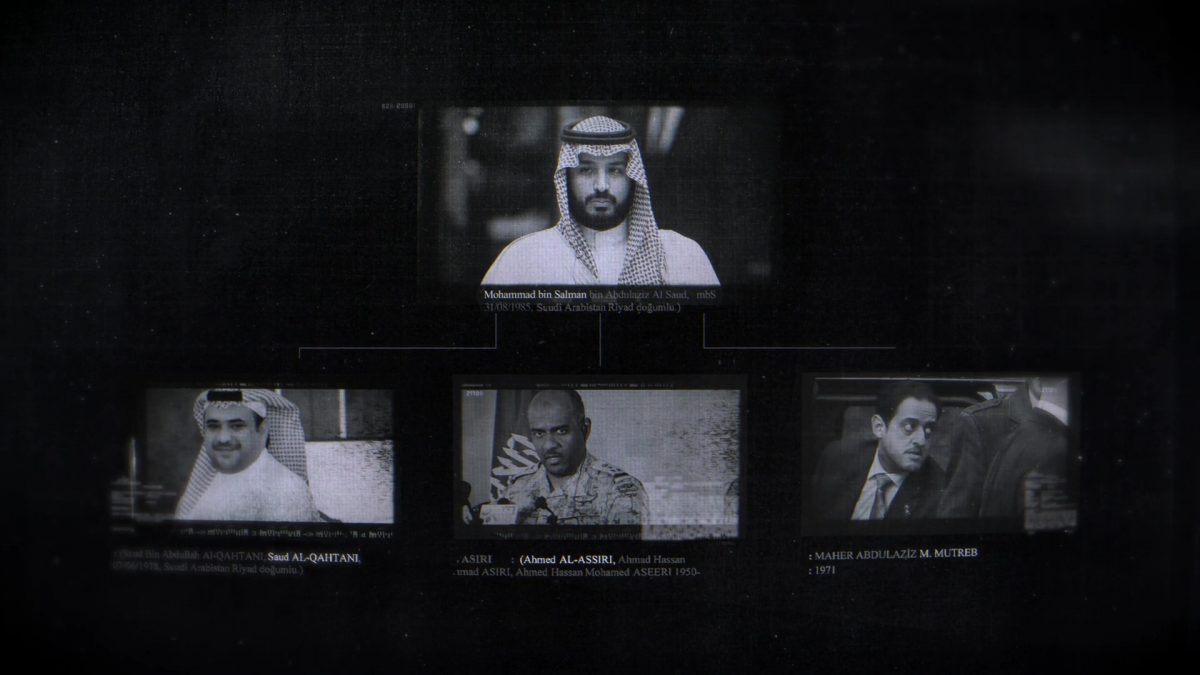
ABDÜLHAMİT GÜL, MINISTER OF JUSTICE, REPUBLIC OF TURKEY [IN TURKISH]: The people that came are high-ranking state officials in Saudi Arabia. These people come from a variety of specialized backgrounds.
IRFAN [IN TURKISH]: The most important, highest-ranking one is Maher Mutreb. This is because he is a member of Prince bin Salman’s security team. He is the one who directed and gave the orders in Istanbul to carry out Jamal Khashoggi’s murder.
Another person who came over is a forensic specialist, called al-Tubaigy. He’s an expert on how autopsies are carried out, how corpses are dismembered.
But those people are just pawns who were carrying out their orders.
GHIDA: The court has issued arrest warrants for two additional suspects in the killing of Jamal Khashoggi. Ahmed al-Asiri was the country’s Deputy Intelligence Chief and high-ranking adviser to the Crown Prince. Saud al-Qahtani was a Royal Court Adviser and key counselor to Crown Prince Mohammed bin Salman.
ABDÜLHAMİT [IN TURKISH]: Currently, our investigation folder contains international arrest warrants and Red Notice alerts for 20 suspects. They broke Turkish laws. The crime was committed in Turkey. Therefore we have the right to put them on trial.
ADEL AL-JUBEIR, SAUDI FOREIGN MINISTER [IN ARABIC]: The person who was killed is a Saudi national. The incident was in the Saudi consulate in Istanbul so it is the concern of the Kingdom.
MALE REPORTER: The chief prosecutor who’s been holding a joint investigation with his Saudi counterpart this week issued a statement following their talks. He says discussions yielded no concrete results, despite Turkey’s intentions to reveal the truth.
IRFAN [IN TURKISH]: I told the prosecutor, “Work with us. Cooperate sincerely with us. Let’s bring out the truth.”
MAN 1: Sir, can you say anything from the investigation?
MAN 2: Where is Khashoggi’s body?
[♪♪]
[CAR HORN HONKING]
OMAR [IN ENGLISH]: I know why Jamal was killed. It’s because of me. I received a phone call, claiming that there is a cyber attack from Saudi Arabia. On dissidents in Quebec, in Canada. He said “Do you suggest any names, or any…” I said “No no no, if they’re going to hack someone, it’s going to be me.”
[♪♪]
JOHN SCOTT-RAILTON: My name is John Scott-Railton. I’m a senior researcher at a place called The Citizen Lab. It’s this group of researchers and investigators that try to understand the digital things that are targeting civil society, so journalists, activists, everybody really, who’s part of what constitutes a flourishing democracy. It’s almost a miracle that we found Omar. It’s a miracle that he survived this long.
[♪♪]
There’s sort of a growing global market for spyware. Governments want to listen to encrypted phone calls. They wanna read your WhatsApp chats, your Signal chats, and they can’t do it as that chat goes across their network. So, their solution to this is, let’s hack the phone.
INTERVIEWER: Was the CIA aware that the Saudis had purchased spyware from Israel?
I’m not going to confirm or deny. That’s either– We’re aware of certain things. All’s I will say is that the Saudi services are able to have insight into what their citizens or what even non-Saudi citizens were doing inside the Kingdom and outside.
[♪♪]
ANTHONY J. FERRANTE, WHITE HOUSE CYBER SECURITY CHIEF, 2015-2017: Saudi Arabia is definitely a major player in the space. Throughout my entire career, I focused on the top four– Russia, China, Iran, North Korea. And I think it’s safe to say that Saudi Arabia has comparable skills and abilities to conduct cyber operations. I think it’s important for people to understand how easy it is to access these tools.
IYAD: Thanks to an Israeli company called NSO, the Saudis have the best hacking technology that money can buy.
Pegasus Version Two.
JOHN S.: Pegasus is a piece of software, but it’s also a capability, it’s the capability to infect a phone and turn it into a digital spy in the pocket of the victim– siphoning off private and encrypted chats, photographs, messages, even enabling the microphone and the camera, turn that phone into a bug in a room.
IYAD: They sent a malicious link. The link looks legit, you know, it looks like, for example, you know, boarding pass, you click on it and it actually goes where it’s supposed to go, but in between, it’s downloading something into your device.
ANTHONY: Once it compromises mobile devices, the end user of the Pegasus tool has unfettered access to that device.
JOHN S.: Think of your phone today, the people you talk to, the photos you take, the places you go, the things that you say around and into your phone, right? This is a huge slice of your life. And that stuff is tremendously valuable to somebody who wants to monitor you, who wants to figure out what you’re doing and maybe who wants to subvert your political activity. Once Pegasus takes control of a phone, it’s game over.
[♪♪]
OMAR [IN ENGLISH]: When they found me, they asked me a silly question. I found it a silly question, by that time. He said, “Where do you go every day between 5 to 8 p.m.?”
JOHN S.: To share information, an infected device is gonna be talking to the servers that control it. It has to phone home. And so we had developed a technique to see what networks might have infected devices. So, what we found in Montreal in December 2018 is that there appeared to be a device in the University Network phoning home to a cluster of servers that belonged to Saudi Arabia’s Pegasus deployment.
[♪♪]
OMAR [IN ENGLISH]: Where do you go every day between 5 to 8 p.m.? I said, “Excuse me?” He said, “No no no no, I’m not, I don’t mean anything. I just want to make sure because we’re seeing that the guy who’s being hacked, he’s switching his wi-fi every day from 5 to 8 p.m.” I said, “Okay, fair enough. From 5 to 8 p.m., I work out at the gym at the university.” So he said, “Okay… Can we meet?”
[♪♪]
JOHN S.: So, we go to Montreal, we sit with Omar and actually find the message on Omar’s phone that we believe led to that infection. It looks like a DHL shipping tracking notification. Only it isn’t.
OMAR [IN ENGLISH]: They could confirm it. So, by hacking my phone, they have everything. Everything. They knew that Jamal was communicating with activists and dissidents. They knew that he funded us. This guy, he used to work for the government for years, for decades. He knew their secrets. Now, to MBS, he’s the enemy of the state. And he’s not just a journalist. He’s a dissident. That’s why Jamal was killed. That’s why a group of my friends and brothers were arrested. Dozens of them. Dozens of them.
AHMED ABDULAZIZ [IN ARABIC]: Man, I swear to God, I am tired, God have mercy on our mother. I swear to God, it’s all in your hands. The only way you can help me is by shutting up. Brother, may God bring you happiness. Stop! I swear it will help me. I swear to God it will help me. For the mercy of our mother, I’m begging you! Stop!
OMAR [IN ENGLISH]: Two of my brothers are still in prison. My brother Majid was severely punished. Severely tortured. Lost his teeth. My youngest brother. This guy is just 19 years old. I just was wondering, thinking, “Why this guy was punished?”
[SOBBING]
[♪♪]
THE UNITED NATIONS
GENEVA, SWITZERLAND
AGNÈS CALLAMARD, SPECIAL RAPPORTEUR, UNITED NATIONS [IN ENGLISH]: When you look at the last two or three years in Saudi Arabia and the campaign against a range of actors… From a human rights standpoint there are circumstances that could not be ignored. Everything suggests that the Crown Prince must be investigated. Even though so far he hasn’t. I am a special rapporteur appointed by the United Nations Human Rights Council. I have a mandate to monitor, report, engage on issues related to extrajudicial or arbitrary killings.
OCTOBER 2, 2018
3:55am
AGNÈS CALLAMARD [IN ENGLISH]: Within the 15-person team, eight of them came on a private jet that had diplomatic clearance. Two individuals in the team had a diplomatic passport. That’s the definition of a state operation. An operation done by state agents, using state resources. It was very clear to me that the United Nations needed to get involved.
IRFAN [IN TURKISH]: The United Nations Special Rapporteur, Agnes Callamard and the delegation that came with her… As they learned the details they were shocked. All evidence in relation to Khashoggi’s murder was shared with the officials.
AGNÈS CALLAMARD [IN ENGLISH]: Are you being allowed in? Are the Saudis allowing you in?
FAHRETTİN ALTUN [IN ENGLISH]: All evidence in relation to Khashoggi’s murder was shared with the officials.
AGNÈS CALLAMARD [IN ENGLISH]: Some of the tape recordings we’ve heard preceded the killing. The doctor, Tubaigy, explained how the body is gonna be dismembered.
[MEN SPEAKING IN ARABIC INDISTINCTLY]
AGNÈS: “Joints will be separated. It’s not a problem.” But the cutting of the flesh could be… more difficult for him. “If we take plastic bags and cut it into pieces it will be finished. We will wrap each of them.” Dr. Tubaigy then asks whether the… sacrificial animal has arrived.
[♪♪]
[CAMERA SHUTTERS CLICKING]
AGNÈS: When he arrives in the consulate, he recognizes the Consul General. He makes a comment about “Oh, you’re here.”
IRFAN [IN TURKISH]: He’s brought to the Consul General’s office on the second floor.
[♪♪]
AGNÈS: The conversation turns to, “Will you come back to Saudi Arabia?” And Mr. Khashhoggi said, “Yes I will at some point. I really want to, but not now.” Mr. Khashoggi makes it clear there is no case against him. And very quickly he said, “There are people waiting for me outside.” The fear is escalating in his voice. Then we hear a struggle.
IRFAN [IN TURKISH]: His mouth is closed with someone’s hand. After they pull what is probably a plastic bag over his head, he’s no longer able to speak.
AGNÈS: You can hear the other people struggling and asking “Is he asleep yet?” “Put your hand there.” “Keep pushing. Keep pushing.”
IRFAN [IN TURKISH]: The suffocation lasts for about.. Seven and a half minutes.
AGNÈS: The most difficult part of those recordings are the noises. At the– toward the end.
IRFAN [IN TURKISH]: They start to cut up the body. With a bonesaw. With a bonesaw.
[♪♪]
WADAH: I was thinking, when he entered his consulate… He is a dignified man. He is a man of courage. When he was dragged, when he was pushed, when he was beaten. What kind of feeling did he have? Because I know this man can’t be treated like that. So it was always painful to me to see the last moments in his life. How painful he felt also. The bitterness, the pain he felt about his people treating him the way that they treated him. He doesn’t deserve that. He never envisaged the evil, the devil in them.
This is a regime that thinks of people as slaves. “You are one of the serfs in the land that I own and you challenged me.”
Mohammed bin Salman at the beginning didn’t mind that people know what has happened to Jamal. He has to be killed in a way that will send a message to everyone else. Because if you kill Jamal with his status, who else you cannot kill? You can kill everyone.
[♪♪]
[POLICE SIRENS BLARING IN DISTANCE]
TRUMP: The king firmly denied any knowledge of it. I don’t wanna get into his mind. But it sounded to me like maybe these could have been rogue killers. Who knows?
[♪♪]
FEMALE NEWS ANCHOR: World leaders are gathering in Saudi Arabia for a summit commonly known as “Davos in the desert.”
IYAD: A couple weeks after the murder, there was a big, important conference for Saudi Arabia.
MALE REPORTER: Davos in the desert is supposed to promote Saudi Crown Prince, Mohammed bin Salman’s reform vision for the Kingdom.
IYAD: Davos in the desert is the make or break part of Vision 2030. But it ended up being a fiasco for MBS.
[♪♪]
DAVID IGNATIUS: The Jamal story galvanized public attention in the United States, around the world. It may destroy MBS’ hopes for modernizing the Kingdom because he needs investors, he needs people who invest in the Kingdom. And right now, he has become toxic.
[♪♪]
MALE NEWS ANCHOR: As pressure on Saudi mounts, several U.S. media organizations and business leaders have pulled out of a major investment conference in Riyadh.
IYAD: The conference happens, all those important guests eventually don’t go. Jeff Bezos was supposed to be a secret guest. Bezos is someone with a direct relationship with MBS. They messaged each other. They talked about business. They talked about, you know, all the great things they’re gonna do together. And he was supposed to declare this enormous deal at this conference. But after the murder, Bezos just stopped all contact with MBS. Bezos owns The Washington Post, which means that Jamal worked for him. It seemed that MBS expected Bezos to say, “You know what? I control this newspaper and I can curb them. I can tell them, you know, don’t make a big deal about this.” But when push came to shove, Bezos did not interfere when The Washington Post started a whole campaign. “Justice for Jamal”.
[♪♪]
MBS saw that as betrayal.
DAVID KAYE: After Davos in the desert, we have evidence that Jeff Bezos’ phone had been infected with malware. And the way in which that technology was delivered to his phone was through a text from the Crown Prince himself. I am the United Nations Special Rapporteur on Freedom of Opinion and Expression. The work that I’ve been doing over the last 18 months or so is on the private surveillance industry.
[♪♪]
A video was sent in 2018 from MBS’ WhatsApp account to Jeff Bezos’ phone. Then we see this massive increase in data leaving the phone. It was only after the killing of Jamal Khashoggi that The Washington Post was an important target for Saudi Arabia. This was exactly the moment when The National Enquirer was saying to Bezos, “We have evidence connecting you to an affair.” So Bezos’ security team is learning that his phone may have been compromised. But at the same time, Bezos is getting WhatsApp messages from MBS that are strange. Essentially, “Whatever you’re hearing about Saudi involvement in this is not true.” In order to send those kinds of text messages, MBS has to know what Bezos is learning about Saudi involvement. And then what we see is that there’s this massive Saudi online campaign, a Twitter campaign, against Jeff Bezos.
[♪♪]
IYAD: The intention was to humiliate and to punish Bezos. It was exactly the same thing that they did to Jamal.
[♪♪]
DAVID KAYE: That mere fact that MBS has the reach to conduct surveillance on the richest man in the world is not only striking, but it’s scary.
DECEMBER 4, 2018
WASHINGTON D.C.
FEMALE NEWS ANCHOR: Earlier today, CIA Director, Gina Haspel briefed a select group of high ranking senators on the killing of Washington Post columnist, Jamal Khashoggi.
SHANE: The CIA Director, Gina Haspel met with the Turks and said, “Show me the audio. Let me hear it.” The CIA Director’s job is to present the information to a policymaker so they can make a decision on how to act. This assessment was different.
BOB CORKER, U.S. SENATOR: If the Crown Prince went in front of a jury, he would be convicted in 30 minutes.
REPORTER: For murder?
BOB CORKER: Yes.
PRESIDENT TRUMP: They’re buying hundreds of billions of dollars’ worth of things from this country. I’m not gonna destroy the economy for our country by being foolish with Saudi Arabia, so…
LINDSEY GRAHAM, U.S. SENATOR: There’s not a smoking gun, there’s a smoking saw. You have to be willfully blind not to come to the conclusion that this was orchestrated and organized by people in– under the command of MBS.
CHRIS WALLACE, FOX NEWS: Did MBS lie to you, sir?
PRESIDENT TRUMP: He told me that he had nothing to do with it.
CHRIS WALLACE: But what if he’s lying?
PRESIDENT TRUMP: As recently as a few days ago.
CHRIS WALLACE: Did you just live with it because you need him?
PRESIDENT TRUMP: Well, will anybody really know, all right? Will anybody really know?
I have not seen, in 20 years covering intelligence, the conclusion from the CIA that is this confident about the role of one person in an act. Everybody but the President agrees that Mohammed bin Salman ordered Jamal Khashoggi’s assassination.
ERDOGAN: We gave the tapes. We gave them to Saudi Arabia. We gave them to the United States. The Germans, the French, the British… We gave them to all of them.
[♪♪]
[RECORDED ANNOUNCEMENT OVER P.A. IN DISTANCE]
OMAR [IN ENGLISH]: Jamal Khashoggi had one dream. To be the voice of the voiceless. That was his vision.
[♪♪]
MANAMA, BAHRAIN
DECEMBER 19, 2014
WOMAN [IN ARABIC]: Good morning. I am pleased to welcome you to this press conference. In which we will talk about a new channel in the Middle East.
[♪♪]
WADAH [IN ENGLISH]: Jamal wanted to introduce a TV station, a new sphere of communication that is free from the tyranny of the state and the propaganda of the state.
JAMAL [IN ARABIC]: It is a public channel, but committed to the traditional rules of journalism which are objectivity, credibility, and neutrality.
[APPLAUSE]
OMAR [IN ENGLISH]: Nothing like The Bees Army. It was way bigger than that.
MAN: Nine, eight, seven…
MALE NEWS ANCHOR [IN ARABIC]: Let me ask you about the subject of freedoms. Are there ‘red lines’ at Al-Arab?
JAMAL [IN ARABIC]: Of course there are ‘red lines.’ We will push these lines further from us.
MALE NEWS ANCHOR [IN ARABIC]: So who is black listed? Do you have a black list?
JAMAL [IN ARABIC]: No one is banned. There is no black list.
MALE NEWS ANCHOR [IN ARABIC]: You don’t have a black list?
JAMAL [IN ARABIC]: No.
[CONTINUES INDISTINCTLY IN ARABIC]
DAVID KAYE: The first day they broadcast, Jamal invites Shiite dissidents on the air, who were the people who the Bahrainian authorities most feared.
OMAR [IN ENGLISH]: Jamal crossed the lines. Because he knew that once you’re scared to talk about your opinion, to criticize anyone, that means there’s no freedom of speech.
WADAH [IN ENGLISH]: After years of preparation, tens of journalists and anchors and presenters and producers hired by Jamal, interviews across the world, millions of dollars put in the project… It only lasted one single day… Before it was shut down.
[♪♪]
OMAR [IN ENGLISH]: At one point, I told you, I believed in Jamal and his ideas. But, he also believed in me.
[MAN CHATTERING IN ARABIC]
OMAR [IN ARABIC]: Come on guys, come on. Be careful.
OMAR [IN ENGLISH]: Weeks before his death, we were talking about creating a talk show. A YouTube show that targets young people. The show is “Say it and walk away.” So Jamal used to say: “Say your word and walk away.” So I’m quoting him here. In the past, I was filming with only me and a cameraman. And now I can imagine millions watching this. God willing. God willing.
[♪♪]
RAND PAUL, U.S. SENATOR: Are we so blind to the malign influence of Saudi Arabia that we just give money and weapons to anybody regardless of what they do? You can cut a dissident into pieces with a bone saw and we’ll still give you weapons?
HATICE [IN TURKISH]: Jamal, can you hear me? You’ve become the rest of my life.
U.S. CONGRESS
SUBCOMMITTEE ON HUMAN RIGHTS
[CAMERA SHUTTERS CLICKING]
HATICE [IN TURKISH]: I still can’t believe how tragic this has turned out to be. And I still can’t believe that the world is not doing anything about it.
Jamal, what’s most difficult is that you left people in a world of politics deprived of your ideas.
OMAR [IN ENGLISH]: I wish that Jamal was here. to see what we’ve accomplished together. Whenever I’m remembering him, I feel I have to do more. I don’t want to fail him.
[PEOPLE CHATTERING]
[AUDIENCE CHEERING]
OMAR [IN ARABIC]: Welcome to our first episode of “Say it…”
AUDIENCE [IN ARABIC]: “And walk away!”
[♪♪]
AGNÈS: [IN ENGLISH]: The evidence gathered suggests that the killing of Mr. Khashoggi was overseen, planned and endorsed by high level officials warranting further investigation of the Crown Prince of Saudi Arabia and of his key advisor, Saud al-Qahtani.
OMAR [IN ARABIC]: They’re trying to convince us that a bunch of government idiots decided on their own to kill the most famous Saudi journalist in the world. They said there were orders to kidnap him? Orders from whom?
AGNÈS: [IN ENGLISH]: Establishment of a UN criminal investigation is essential for the delivery of justice.
WOMAN: Thank you. I now give the floor to Saudi Arabia.
[SPEAKING IN ARABIC]
INTERPRETER [IN ENGLISH]: Thank you. Accusations have been launched and fingers have been pointed, we reject any attempt to remove this from our national justice system in Saudi Arabia in respect to the form that that may take. Many thanks.
OMAR [IN ARABIC]: Although half the assassination team worked for him or were his private bodyguards of course, he didn’t know! The team took two private planes from the country’s fleet. The assassination team are Saudis. The victim is Saudi. The land is Saudi. Of course he is not aware!
[INTERVIEWER, 60 MINUTES] Did you order the murder of Jamal Khashoggi?
[MOHAMMED SPEAKING ARABIC]
INTERPRETER [IN ENGLISH]: Absolutely not. Some think that I should know what three million people working for the Saudi government do daily? Absolutely not.
[PEOPLE CHATTERING]
HATICE: My name is Hatice Cengiz. I’m addressing you as a victim, a title forced on me after the brutal murder of my Jamal. Jamal and I would have been husband and wife by now. The failure to punish Jamal’s murderers affects us all. But also democracy, human rights, and freedom. Mr. Chair, the truth always wins. History will take note. Please take action. Thank you.
OMAR [IN ARABIC]: I feel sorry that the next generations will come and not know the meaning of freedom. They won’t have a sword or a pen. What will we do? This is my word. I say it and walk away. Farewell. Be free.
[♪♪]
FOLLOWING THE CIA’S HIGH LEVEL OF CONFIDENCE THAT MOHAMMED BIN SALMAN ORDERED JAMAL KHASHOGGI’S MURDER CONGRESS PASSED BIPARTISAN LEGISLATION BLOCKING BILLIONS OF DOLLARS IN ARMS SALES TO SAUDI ARABIA.
PRESIDENT TRUMP EXERCISED HIS VETO POWER AND ALLOWED ALL WEAPONS SALES TO PROCEED.
SEPTEMBER 7th, 2020
SAUDI ARABIA SENTENCED EIGHT PEOPLE TO PRISON TERMS OF BETWEEN 7 AND 20 YEARS FOR THE MURDER OF JAMAL KHASHOGGI.
THEY WERE TRIED IN SECRECY, NAMES WERE WITHHELD, AND NO ONE WAS ALLOWED TO SEE THE EVIDENCE USED TO CONVICT THEM.
THREE SUSPECTS WERE CLEARED OF ANY WRONGDOING:
OMAR’S BROTHERS AND 22 OF HIS FRIENDS REMAIN INCARCERATED AT DHAHBAN MAXIMUM SECURITY PRISON IN JEDDAH.
THERE HAVE BEEN NO CHARGES FILED AGAINST ANY OF THEM.
THE U.S. DEPARTMENT OF JUSTICE CHARGED TWO TWITTER EMPLOYEES WITH SPYING FOR SAUDI ARABIA. THE EVIDENCE SUGGESTS THOUSANDS OF ACCOUNTS WERE HACKED, INCLUDING THOSE OF OMAR ABDULAZIZ AND JAMAL KHASHOGGI.
SIX WEEKS LATER, TWITTER ACKNOWLEDGED THAT ITS PLATFORM HAD BEEN MANIPULATED BY A STATE-SPONSORED PROPAGANDA CAMPAIGN. THE COMPANY PERMANENTLY SUSPENDED 88,000 ACCOUNTS CONNECTED TO THE KINGDOM.
OCTOBER 2, 2019
A MEMORIAL FOR JAMAL WAS HELD ON THE ONE YEAR ANNIVERSARY OF HIS MURDER, JUST OUTSIDE THE SAUDI CONSULATE IN ISTANBUL.
WADAH [IN ENGLISH]: All of us today, have become the voice that Jamal wanted the world to hear. We shall never forget Jamal, neither the cause and mission that Jamal stood for.
JEFF BEZOS: Hatice, you paced that street and waiting for hours. No one should ever have to endure what you did. We are here and you are not alone.
[APPLAUSE]
HATICE [IN ENGLISH]: Today, I stand here broken, but proud. I still seek justice. And I want those in power held accountable for their actions.
TO DATE THERE HAVE BEEN NO GLOBAL SANCTIONS OR PUNISHMENTS AGAINST SAUDI ARABIA FOR THE MURDER OF JAMAL KHASHOGGI.
NOVEMBER 21ST, 2020
THE LEADERS OF THE WORLD’S RICHEST COUNTRIES MET IN RIYADH FOR THE G20 SUMMIT HOSTED BY MOHAMMED BIN SALMAN.
WADAH [IN ENGLISH]: The Middle East is being reborn again. There are other writers who think we should try to preserve the old system. But the new Middle East that will come out after the dust settles down should not be like the old system, because the old system has failed.
[WOMAN VOCALIZING]
[WOMAN SINGING IN ARABIC]

